#Marathon C-300
Text


A Canadian Marathon C-300 electric car at the Csepel car factory in Szigetszentmiklós, 1977. From the Budapest Municipal Photography Company archive.
120 notes
·
View notes
Note
Can you write something about Shanks x reader? Like, the reader was teleported by Kuma, now she's on Shanks's ship and he offered himself to train her. (Can be fluffy with a little bit of angst. And slightly of age gap)
I loved the idea✨. Shanks is one of my favorite OP characters (after Luffy, Kid and Zoro, of course). And I wrote this while marathoning One Piece (I'm still in the Punk Hazard arc 😭) one eye was on the caption and the other eye was on the writing.

"Let me help you"
Pairing: Shanks x gn!reader
Warning: slight angst, fluff most of the time.
W/C: 18.1k

You, as a resident of the Sabaody Archipelago since birth, are good friends with Rayleigh and Shakky. Ever since you were 7 years old, you would sneak out of your house to visit Shakky's Rip-off Bar just so you could listen to Rayleigh tell several of his adventure stories from when he was still a pirate while Shakky prepared his favorite juice. It was like a hobby, and you loved it.
You just didn't expect that on another calm, sunny day, a seriously injured fish-man, a mermaid, a talking starfish and a group of very strange pirates would show up at Shakky's bar.
At the bar, as you sipped a beer, you watched the scene unfold in front of you, seeing what looked like a pet bandaging the fish-man.
"A raccoon?" You said, tilting your head to the side. The animal in question looked furious and turned its head towards you. "I AM NOT A RACCOON, I AM A REINDEER!" the reindeer exclaimed, blowing smoke out of its nostrils. He went back to what he was doing, muttering quietly.
Rayleigh, smiling, came to his side, taking a seat in front of the counter.
"What happened while you were out?" You asked Rayleigh, as Shakky offered him a glass of beer.
"Oh, I was almost sold into slavery," Rayleigh said, as calmly as if this happened to him often. "EHHHH?" You were shocked, not that enslaving humans shocked you, as much as you found it disgusting, but who in the world could capture Silvers Rayleigh to be sold! That didn't fit at all.
"How did they catch you? And how did you escape?" You kind of already knew the answer, just the use of the King's Haki was enough for Rayleigh to get away.
"I had the help of that little guy over there" He pointed his chin at the boy with a straw hat on his head who ate like a pig, if not worse. Rayleigh was now talking to Shakky, while you brought the glass of beer to your lips, feeling the bitter taste of the cheap drink. "Ah, did you know that he faced a Tenryuubito?"
Immediately, you choked on that information, beer coming out of your nose.
"Ahhhh, a lady!" A blond man came up to you with hearts in his eyes, offering you a handkerchief. "How could I not see you there? With this beauty that blinds a man, forgive me miss, you don't deserve such disgrace." You ignored the chatter of the blond man with the strange eyebrows and walked over to the boy in the straw hat.
"EI" You caught his eye and that of the rest of the people present. "Are you crazy? Do you want to attract the attention of the navy by taking on a Tenryuubito?" You snorted next to the boy. You, in your thirties, had never heard such an appalling event.
Swallowing the piece of meat he was eating, the straw hat said, "I'm not crazy! And I only did it because that idiot shot Hachi, so of course I'm going to fight back!" He exclaimed, looking at you with a kind of determination. That shocked you to some extent. You sighed heavily "Still, who are you to stand up to a protégé of the World Government?"
"I'm Monkey D. Luffy, and I'm going to be the King of the Pirates!" Luffy exclaimed once again, taking the large piece of meat into his mouth and swallowing.
"Ah, so you're that pirate with a 300 million berry bounty," you said, leaning against the counter. "But that won't solve anything, the navy will surely strike back."
"Actually, it's likely that they're already on their way here" Rayleigh said "Hey Shakky, I want some more beer" He said, indignant that his drink had run out.
You sighed once more, feeling the pangs of a headache when too many bad things were happening at once. After a while, the Straw Hat pirates left the bar, saying they were going to stay in the archipelago for another three days to throw off the Navy. The place was now silent, leaving only you, Shakky, Rayleigh, Hachi and his friends, whom you knew as Camie and Pappag. In your mind, the events of now were running wild.
A few hours later, Rayleigh stood up, heading for the door of the bar.
"Where are you going?" You asked, crossing your arms.
"I'm going to help Luffy" He left before you could say anything else. "Tch, what a stubborn old man" You exclaimed.
"Come on, he can take care of himself, you know that" Shakky said smiling as he cleaned the counter

Hours and hours passed and no news about Rayleigh or the Gang of Straw Hats.
You paced back and forth, anxiety running through your mind as you bit your nails. You stopped, looking at the door. Making up your mind, you headed for the exit, ignoring Shakky's protests for you to stay.
Running through the mangroves, you followed the sound of explosions, the smoke filling your lungs every time you got close. Arriving at your destination, you saw that the place was a zone, pirates everywhere, navy soldiers firing into the wind. Scanning around, you found Rayleigh fighting Kizaru, a navy admiral you knew only by face. Before you could get to Rayleigh, a familiar shout made you stop, turning in the direction of the sound. It was Luffy shouting, while his companions were fighting Kuma, one of the Navy's seven Shichibukais. When Kuma's hand touched one of Luffy's companions, one with orange hair, she disappeared in the blink of an eye.
On impulse, you went over to them, wondering if you could help them. You barely knew Luffy, but the short time you spent together was enough for you to judge him as a man of good intentions.
As you ran towards them, you saw that some of Luffy's companions were missing. You guessed that they had been defeated, probably by Kuma.
"Luffy!" you shouted, pulling him out of the way of Kuma's hands, but this only resulted in one thing: you tripping over something you didn't identify and falling to the ground. You turned to Kuma, pulling a gun from your waistband as you fired wildly at him, but it had no effect.
"A friend of Luffy from Straw Hat?" The Shichibukai said, staring at you for a few seconds before his giant hand touched you, the power of his Akuma no Mi taking effect, his body disappearing. You felt an enormous pressure in the room, causing you to faint immediately afterwards.

You felt trapped in something soft while you were lying down. It was as if you were lying on a pile of clouds. Opening your eyes slowly, small pains spread through your body. On closer inspection, you were flying in the sky, but you couldn't feel the breeze and, incredibly, you didn't feel short of breath because you were wrapped in a kind of bubble. Dramatically, the memories returned to your mind, making you feel pathetic.
"Damn, I couldn't do anything useful" you thought to yourself, mulling it over as the bubble carried you across the vast sky. You still had the gun in your hand, so you put it in your waistband, not that it was any use without bullets. You didn't know how many hours or days you had slept, but you wanted to know what your fate would be. Before you could think of anything else, the bubble protecting you landed, startling you. What if it fell into the open sea? You knew how to swim, but sea monsters could appear anywhere.
Your thoughts were interrupted when you fell into a ship, hitting your back on the wooden floor.
"Damn…" you cursed, then got up and opened your eyes, only to find a bunch of men around you. A pirate ship, your senses alerted you, making your hand go towards the gun you always carried, pointing it at several of the men.
"Boss, come and see this." A portly man with a piece of meat in his hand spoke up. As the men around you moved away, you could immediately feel an overwhelming presence. Turning in the direction of the presence, you could see a man with red hair and a scar on his face coming towards you. Immediately, you recognized the man. It was impossible not to recognize the pirate in question, given the fact that both his person and his deeds were notorious and circulated widely on people's lips. It was Shanks, The Redhead, a name that made many people shudder just to hear it.
Your body trembled, the gun in your hand wavering as you pointed it in the Redhead's direction, bitterly regretting your decision, but you were too proud to turn back.
"Well well, looks like we've got a scared kitten here," Shanks laughed, looking over at you. He crouched down very close to you, leaning his forehead against the barrel of the gun. "Aren't you going to shoot?" A faint smile appeared on the pirate's face as he stared into your soul.
"Don't play games with me," you said, with great difficulty, trying to sound strong, but coming out more like a cry for help.
Shanks stared at you for what seemed like an eternity, before bursting into laughter, his body tilting backwards, his men doing the same. You, not understanding anything, blushed intensely with embarrassment. "Ouch, scaredy-cat, how the hell did you get here out of nowhere, huh?" Shanks asked after wiping a tear from the corner of his eye.
You, seeing no point in hiding the truth, (not as if you could, Shanks would get the truth out anyway) told him the truth. He understood, saying that he knew Luffy, then smiling, saying that the boy only got into trouble.
"Well, what if I taught you how to fight for real?" He came up with the idea out of the blue, while sipping sake sitting on one of the ship's barrels.
You looked at him, surprised by his proposal. You looked at the ground, remembering how pathetic you were to try to fight a Shichibukai when you didn't even know the basics of anything. You looked at Shanks again, determination shining in your eyes.
"Please teach me how to fight!"
Shanks smiled, setting the sake aside as he stood up. "Looks like the scared little kitten has guts. I like that about you."
You blushed slightly at his words, standing up too. "Well, I'll teach you everything I know."
Days and days went by as Shanks taught you the most varied fighting techniques. Months later, he saw that you were strong enough to learn how to use Weapons Haki and Observation Haki. A year and a half flew by and you didn't even notice. Along with fighting and teaching, you developed feelings for Shanks.
It started with the nicknames; kitten, shawty, cutie. Then there were touches here and there. As well as the time you spent together without fighting or learning the theory of anything. Just the moments Shanks spent recounting his adventures with a twinkle in his eye in the dead of night when most of the pirates were too drunk to sober up. And you listened to every word that came out of his mouth with admiration, secretly happy for the adventures he had been through. There were also the times when he and the crew tried your sweets, from the first day you started making them, with the excuse that it was payment for his teaching and temporary hospitality. But you couldn't deny to yourself that the reason was just to please him as much as possible, so that you could receive a pat on the head or a mess of hair, followed by compliments from the redhead.
Oh, and let's not forget the flirting. The damned flirting that he would give you with that mischievous little smile, to which you would respond back with rosy cheeks, not wanting to be left behind in any way, especially when it came to Shanks.
And on this night in question, it seems he was loaded with flirting to try and embarrass you while everyone drank and ate outdoors, partying for nothing.
"Hey Y/N." The sound of the redhead's sweet voice caught her attention, her head turning in the direction of the melody that called her name. Seeing him sitting next to Benn, sipping a sake, you smiled, putting your hands on your waist. "Yes, Shanks?" You answered the man, already preparing yourself for what was to come.
"If I happen to drown, do I get a mouth to mouth breath from you?" he asked, his damn winning smile opening the door for your heart to skip a beat.
Her legs turned to jelly for a moment, never getting used to the feeling of receiving the slightest bit of attention from Shanks.
"Well, try your luck and I'll be happy to do it," you replied, putting a false smile on your face, but you didn't know whether to throw yourself into the sea out of embarrassment or kiss Shanks in front of everyone.
Shanks, being the flirt he was - very professional, so to speak - didn't expect you to be able to respond to his flirting, or even better than that, which caused the man to have a total meltdown, leaving him speechless.
"HAHA, Y/N dismantled the boss" Lucky laughed out loud, his companions laughing next, bringing Shanks to attention, his cheeks slightly flushed. He hid his smile as he turned over the sake bottle.
After an hour or so, the crew of the Redhead Pirates were too drunk to even stand up. Some went to sleep in their rooms, others blacked out in whatever corner of the ship was considered "comfortable".
You were washing the dishes that the men had soiled during the party. Living with men wasn't easy, since Benn was one of the few who cared at all about the cleanliness of the ship. So you did the cleaning, since you couldn't stand living in the mess and dirt.
You started thinking about your home in Sabaody, missing Rayleigh's stories, Shakky's cheap booze, the cotton candy from the Archipelago that tasted special. You felt a pang in your chest from nostalgia. You were so absorbed in your thoughts that you didn't feel the presence of Shanks behind you, only sensing when his arms were wrapped around your waist, his chin resting on your shoulder. The man's sudden movement made your body shudder. "Shanks?" You looked at him, confused.
He looked at you, while smiling faintly. "Yes, kitten?" he purred softly, his nose sinking into your clothes, his eyes closing as he inhaled your perfume deeply.
In that situation, you felt stagnant, not knowing what to do. Your heart was pounding like crazy, your hair was standing on end, and the desire to kiss him right then and there was greater than anything in the world.
You swallowed dryly, dropping the dishes from your hands as you wiped your hands on the cloth on your other shoulder. "Are you even sober?" You asked, apprehensive of his answer.
Shanks opened his eyes, squinting at you for a few seconds, then immediately turned his body so that you were facing him. Shanks' muscular body pressed against yours, making you breathless. "Enough to answer for my actions." Shanks said, their faces very close together, Shanks' lips almost touching yours as his eyes roamed over your lips, without any shame in facing them.
You were losing your sanity and along with it, your patience. "Kiss," you said, drawing his attention instantly to your eyes. "If you have the courage, of course." You challenged, your breathing pausing for a moment to see what he was going to do.
"You asked for it," Shanks said before attacking your lips, and what began as a sloppy kiss, saliva spilling out, continued with a kiss of dominance from both of you, tongues and teeth clashing, making you both lose your breath, while his hands circled your waist, squeezing lightly from time to time, and you snaked your arms around his neck, stroking his soft hair. You separated so you could breathe.
That didn't stop Shanks from sprinkling wet kisses all over your face, which you gladly accepted, not letting any opportunity pass you by. "Be part of my crew" he said breathlessly "I like you. I like you a lot. I can't let you get away from me." The redhead's statement made your heart leap, longing for this moment since the day you realized you liked that man. "Please?" He asked, his pleading eyes looking at you while his face was a pure mess, and you were probably on the same level. It stirred you, a chill in your stomach settling in.
"Yeah," you didn't have to think long. God, it was Shanks over there, begging you like a puppy to stay by his side. "And I like you too." Both the statement and the quick acceptance surprised Shanks, making him blink a few times. "That easy? I thought women played hard to get at times like this." His arms encircled your body even more, bringing you closer to him.
"Well, I'm a straightforward woman. But I need you to stop by the Sabaody Archipelago. I need to know how Shakky and Rayleigh are doing after all that mess with the Navy," you said, your hands on Shanks' bare chest. Shanks' eyebrows rose. "You know Silvers Rayleigh?" he asked, surprised.
"Yes… he's like a father to me" You said, tilting your head to the side. "You've never said that to me," the redhead uttered, indignantly.
Instead of just replying with a simple "sorry", you decided to be mischievous. "Do I have to?" you said, a little smile playing across your face. Shanks sighed in shock, then smiled and pinched your nose. "You little brat, respect me, I'm older than you"
"It's only nine years apart," you smiled, joining in the fun as you enjoyed your evening, knowing that you had made the right choice from the start.

If you've made it this far, I take off my straw hat. Jokes aside, but I got too carried away writing this, sorry if it's too long. And I hope you enjoyed it, I really do.
#shanks x reader#red hair shanks#shanks#one piece#love#strangers to lovers#fighting#fluff#slight angst
77 notes
·
View notes
Text
300 followers celebration
okay wtf guys im actually gonna cry :). thank y'all so much for all the love you have given me.
im gonna start by apologising because I have not been that active. i went and saw challengers, started watching ted lasso and got into professional cycling, and my exams are just about to finish and im gonna be honest i have been just reading fanfiction based on those. (because my ADHD hyperfixation has hit this point)
also small apology to the people waiting on the bachelor fic, i've rewritten the first chapter twice, but rest assured once i get the first chapter out of the way, the next few will come in quicker
But I am getting back into the hot men of f1, thank god, and initially this celebration was going to be closer to july, but here we are, and so this event will run a while.
Basically to explain it's an f1 x olympics!reader :) because i have a hyperfixation on the olympics
Rules:
Pick 1 letters, one for the person and one number for the reader's sport - i will then make a moodboard AND A small blurb :) (cause i need to get out of the writing slump)
my guidelines are here
i am only writing for the drivers and related people listed (but if you really want another driver, chuck it in my inbox and ill probably make it anyway)
this is only for moodboards and short blurbs, however my requests will remain open through the celebration so if you're inspired by this but want something else instead feel free to head to my inbox :)
please be patient - it may take me a few hours to do yours, but depending on how many requests I get, it could take a few days
please specify gender, else i'll probably make it gender neutral
for now no limit on how many requests 1 person can submit, but if i get overwhelmed I will
i will take description requests, face claim requests, blurb requests, country requests, whatever you want to specify BUT all I need is 1 letter, 1 number and a gender for reader :)
the event will close on the 11th of august (when the olympics end) (and also so i have a little bit of a time before a birthday celebration!)
NOW TO THE CELEBRATION:
PICK 1 LETTER - ONE FOR DRIVER
AND PICK 1 NUMBER - ONE FOR READER
drivers!
A - Alex Albon
B - Ollie Bearman
C - Charles Leclerc
D - Mick Schumacher
E - Esteban Ocon
F - Fernando Alonso
G - James Vowles
H - Liam Lawson
I - Peter Bonnington
J - Jack Doohan
K - Kimi Raikkonen
L - Lewis Hamilton
M - Max Verstappen
N - Lando Norris
O - Oscar piastri
P - Pierre Gasly
Q - Logan Sargeant
R - Daniel Ricciardo
S - Carlos Sainz
T - Yuki Tsunoda
U - Lance Stroll
V - Sebastian Vettel
W - Mark Webber
X - Paul Aron
Y - Toto Wolff
Z - Jenson Button
reader!
breaking
boxing
volleyball
golf
rhythmic gymnastics
tennis
modern pentathlon
weightlifting
equestrian
bmx cycling racing
football/soccer
basketball
archery
diving
shooting
handball
triathlon
water polo
judo
swimming
hockey
wrestling
marathon swimming
3 x 3 basketball
trampoline gymnastics
sport climbing
mountain bike cycling
rugby sevens
track cycling
road cycling
sailing
sprint canoe
beach volleyball
badminton
taekwondo
bmx freestyle cycling
canoe slalom
fencing
rowing
surfing
skateboarding
artistic gymnastics
artistic swimming
athletics
table tennis
taglist of people who i hope are interested (if not just ignore :) ):
@barcelonaloverf1life, @leosxrealm, @tallrock35, @wolf-knights, @janeholt3, @badblondebisexualboy, @ghostking4m, @fate-posts, @evelyn-4034, @jupiter-je-taime, @redcrescentmoons, @youraveragebritishamerican, @v3lnys, @thatonesblog, @seventeendevotee, @annegrey, @pear-1206, @alchemxx
#f1 moodboards#f2 moodboards#miloformula123fan#f1 x reader#f1 fanfic#f1 x male reader#f2 x reader#f2 fanfic#f2 x male reader#alex albon x reader#formula 1 x reader#formula 2 x reader#formula 1 moodboard#formula 2 moodboard#formula 1 moodboards#formula 2 moodboards#ollie bearman x reader#charles leclerc x reader#mick schumacher x reader#esteban ocon x reader#fernando alonso x reader#liam lawson x reader#kimi raikkonen x reader#lewis hamilton x reader#max verstappen x reader#lando norris x reader#milo300#james vowles x reader#jack doohan x reader#peter bonnington x reader
16 notes
·
View notes
Note
hello I was hoping to get advice on running! i was never particularly athletic but started doing couch to 5k and have just hit the 3mi mark but it’s TOUGH and I don’t really feel like I can easily do it. How do I get better at running, and faster and be able to hit longer distances? is it just practice? it seems so far out of reach 😭 my hip also hurts when I run but is that just because I’m bad at running?

hey, congrats on hitting your 3 mile mark, that’s incredible! i remember the first time i ran 3 miles and it was also tough. one thing i know now was i was going way too fast!
the answer to most of your questions is to just run more, but i would specifically advise slowing down as you run more.
slow down so much it seems easy and you could have a chat while running those three miles. it might feel “too slow,” and might seem silly to go that slow, but this is how you a) make three miles not feel tough, b) go longer distances, and c) get faster. this is also how you preserve your own mental fortitude by not making running miserable all of the time.
running is miserable some of the time, and i would even venture that it should be miserable a very slim sliver of the time, like when you’re doing hill repeats or sprinting or you just hit mile 24 of a marathon. but i digress.
also, the slower you run the farther you can go. if you want to go farther and eventually get faster, you need more time on your feet; more time running causes physical adaptations in your body that make running easier/more efficient. and importantly, you cannot force these adaptations by going faster or farther than you’re ready to, you can only injure yourself this way.
if you wanna go farther and faster, you can’t increase both at the same time. your body isn’t adapted to both, and asking it to adapt to both is a recipe for injury. pick either distance or speed to increase and do so very cautiously. finishing a workout and feeling like you’ve still got gas in the tank is a good thing.
and at the beginning of your running journey, just running more is likely going to improve your ability at both speed and distance.
idk how many miles you’re running per week, but the common idea is, don’t increase your mileage more than 10% per week. so if you ran 10 miles this week, no more than 11 next week.
about the hip pain—right out the gate, this isn’t medical advice and i recommend a physical therapist, which is how i cured my own hip pain when i first began running. she identified muscle imbalances in my body—namely that my thigh muscles were a lot stronger than my glutes, which were not activating during running and my thigh muscles and my hip flexors were overcompensating, hence the pain. so your issue could be strength based, and strength training is incredibly helpful to running even if that’s not the source of your pain. it could also be to do with your gait when running, which is something a PT can help you sort out. i had to change my gait significantly in addition to strengthening my glutes to sort my pain. another possible culprit is your shoes. your running shoes might be old, after about 500-700 miles, you should retire your shoes; after about 300 miles shoes will start to be affected by the use. so if your shoes are old or aren’t exclusive or specifically running shoes, time for new ones.
it could also be that your shoes are not the right specs for your body/gait. i run in shoes with a high drop (10mm), which is the distance between the heel and the toe of the shoe. i once tried to change brands of shoes and switched to an 8mm drop thinking i’d be fine, but i was not fine. i had tendinitis in my achilles for two months following ~60 miles in the new shoes. i went back to a new pair of my old shoes and the tendinitis went away.
SO that’s a lot way to say idk see a PT.
and while soreness is to be expected and a little ache or two, running shouldn’t cause real pain, and if it is, that’s a sign somethings up. it doesn’t mean you’re a bad runner either, it just means you need to pay attention and make some adjustments.
don’t seek a destination (like getting faster) when running, just run. it’s not going to be a steady incline of progress where each run improves on the last. your ability to enjoy the act of running itself will help you stick with what can be a lifelong hobby. and that brings me back to—slow down.
and as for running in the heat, it will always be harder than running in cool/cold. my paces drop significantly in the heat no matter how much i run in it. it also makes you sweat more, which means you’re losing (and thus need to replace) more water and more electrolytes when running in the heat vs running in the cool.
be kind to yourself. if running feels hard one day, whether it’s because of heat or because of life stress or bad sleep or whatever, just go easier so you can enjoy it and stick with the habit—this will almost always lead to improvement, but it certainly won’t make you worse at running.
good luck!
15 notes
·
View notes
Text
F@tT Fic Marathon: 201-220

so... i broke my foot this weekend, and having a broken bone means i had a lot less time for fic reading this week because it means everything takes longer, is more exhausting, and what energy I do have has to be prioritized for other things like school. BUT i still got through some cool reading
wading into the 300s I'm excited to report that the first Bluff City fic has shown up in the tag! sooner or later it comes down to faith by fangirl_squee
now, I'm not an alyosha/arrell man, but there are two longer (one unfinished) fics for the pair in this set that happened to work pretty well for me! A History of Partings by LuckyDiceKirby worked for me by virtue of starting at the beginning of their relationship. Mortal Liminality, Volume 2 by 3RatMoon is an au where Arrell is a ghost living in Alyosha's apartment. i think perhaps this hit for me bc Alyosha is depicted with a chronic illness/pain and it spoke to me while I limp around on my stupid crutches in my stupid stabilizing boot
other stand outs include:
confidence in msucle and ambition by kapbird - a sokrates and integrity counter/weight focused fic. i just really like how integrity's voice is represented as a different font
If Over-Compressed Jpegs Teach Us Anything, It's That There's No Such Thing as an Acceptable Loss by Dragonomatopoeia - another c/w fic, cass perspective, mostly focused on mako's emotional issues. i think the title of this is very funny, and i like the metaphor for memory that is represents
words read: 74,669 (643,144)
works remaining: 1,689
next twenty:

8 notes
·
View notes
Text

Tag 27. 30.07.2023
22KM auf dem Tacho. Nach unserem Marathon-Tag gestern verließen wir erst 11:00 Uhr das Haus. Wir waren beide im Tiefschlaf, Schlaf, den wir unbedingt brauchten. Zuerst ging es zum Pokémon Shop, wo verschiedenste Memorabilia der japanischen Serie verkauft wurde. Erkennt ihr ein paar Pokémons wieder? Daraufhin ging’s auf den Nishiki-Markt, wo wir Gyoza Knödel kosteten, verschiedene Fischstände beäugten und das Karasuma Viertel erkundeten. Da unsere U-Bahn Karten eine Malfunktion hatten, fuhren wir zum Hauptbahnhof, um das Problem zu beheben.
Nach erfolgreichem Beheben des Problems hieß das nächste Ziel das Gion Viertel. Nach Bewunderung des Yasaka-Schreins liefen wir über die Hanamikoji Straße Richtung Kennin-Ji Tempel. Der älteste Zen Tempel Kyotos, im Kennin-Ji standen wir voller Ehrfurcht und besichtigten die Ausstellungsräume samt Decke der Drachenzwillinge und Gärten. Im Anschluss ging’s nach Sannenzaka ins Starbucks Nineizaka, der einzige Starbucks weltweit mit traditionell japanischer Tatami-Sitzboden. Wir tranken Kaffee und einen Karamell-Milkshake, probierten Earl-Grey Donuts und unterhielten uns lebhaft mit einer kanadischen Familie aus Toronto.
Gegen 17:00 Uhr marschierten wir hoch zum Kiyomizu-dera Tempel auf dem westlichen Hang Kyotos und besuchten wunderschön bemalte Tempelgebäude, die im Wald verstreut waren. Wir machten beide einige Bilder und liefen schließlich zur U-Bahn Station, als letzte Station des Tages war nämlich das Shinto-Schrein „Fushimi Inari-Taisha“ angesagt. Berühmt für seine tausenden roten Tori-Tore, schlenderten wir vorerst in der Dämmerung durch die Tore. Webster wollte jedoch unbedingt nach oben und (was wir erst im Nachhinein rausfinden) hieß dies 300 Höhenmeter und durchnässte T-Shirts. Zumindest hatten wir nicht mehr 36^C und unversöhnlichen Sonnenschein. Zum Abendessen ging’s 21:00 Uhr in der Nähe des Hotels erneut in ein Ramen-Restaurant, wo es köstliches Ramen und frittiertes Hühnchen gab. Gerade schauen wir Formel 1 und ruhen unsere Beine aus, die heute verrückte 22km mitmachen mussten. Gute Nacht und einen guten Wochenstart!
Day 27. July 30, 2023
22 kilometers on the odometer. After our marathon day yesterday, we didn't leave the house until 11:00 a.m. We were both in a deep sleep, much-needed rest. First, we went to the Pokémon Shop, where various memorabilia of the Japanese series were sold. Can you recognize a few Pokémons? Then, we headed to the Nishiki Market, where we tasted Gyoza dumplings, checked out various fish stands, and explored the Karasuma District. As our subway cards malfunctioned, we went to the main station to fix the problem.
After successfully resolving the issue, our next destination was the Gion District. After admiring the Yasaka Shrine, we walked along Hanamikoji Street towards the Kennin-Ji Temple. The oldest Zen temple in Kyoto, we stood in awe at Kennin-Ji and visited the exhibition rooms with the Twin Dragon ceiling and gardens. Next, we went to Starbucks Nineizaka in Sannenzaka, the only Starbucks worldwide with traditional Japanese tatami seating. We had coffee and a caramel milkshake, tried Earl Grey Donuts, and had a lively conversation with a Canadian family from Toronto.
Around 5:00 p.m., we walked up to the Kiyomizu-dera Temple on the western slope of Kyoto and visited beautifully painted temple buildings scattered in the forest. We took some pictures and finally headed to the subway station, as the last stop of the day was the Shinto shrine "Fushimi Inari Taisha." Famous for its thousands of red torii gates, we strolled through the gates in the twilight. However, Webster insisted on going to the top, and (as we later found out) this meant climbing 300 meters in elevation and ending up with soaked t-shirts. At least, it wasn't 36°C and scorching sunshine anymore. For dinner, we went to a ramen restaurant near the hotel at 9:00 p.m., where we enjoyed delicious ramen and fried chicken. Right now, we are watching Formula 1 and resting our legs after the crazy 22km they endured today. Good night and have a great start to the week!




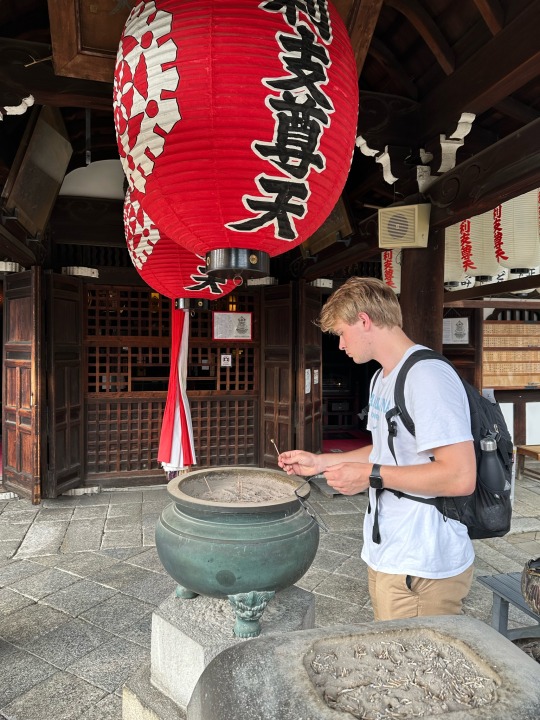




3 notes
·
View notes
Note
Okay thanks to movies and series many foreigners are aware of the Trojan and the Thermopylae war (with the 300 Spartnas). But i believe not many know other important battles that happened during ancient Greece.
Which ones do you think are also worth mentioning?
Just some clarifications for interested people who might not know:
While the Trojan War (sometime in c. 1299 BCE - c. 1100) did happen, we have no idea how accurate any realistic event in the Iliad is. The only thing we know is that the consequences of the war were terrible for both sides. The aftermath is believed to have led to a period of deep regression even in victorious Greece, which is known as the Dark Ages.
The Battle of Thermopylae (not war) (480 BC) is a very real battle, part of the ongoing Persian Wars, meaning the attempts of the Persian Empire to conquer the Greek city-states. While the battle was a defeat stained by treason, the conscious sacrifice of the tiny Greek army caused an uprise of pride and resistance from the Greek people, who up to that point were torn as to whether they should fight or not risk opposing to the massive empire. This is why this battle is considered so important.
So some other turning points in Ancient Greek war history were:
The Battle of Marathon (490 BC). First victory of the Greeks against the Persian King Darius I, despite his much larger forces. The Athenian general was Miltiades. Darius wouldn't return but his son Xerxes attempted to materialize his father's dream 10 years later. Western scholars deem this one of the most significant battles in world history.
Naval battle of Salamís (480 BC), Battle of Mycale (479 BC) and the Battle of Plataea (479 BC). Greek victories. In the Battle of Plataea, the Greeks finally manage to create a big army (for Greek standards). This was the final battle that ended the Persian ambitions over Greek territory once and for all.
Many important battles took place during the Peloponnesian War (431 - 404 BCE) but since this was just something that we nowadays would call a hell of a civil war, I don't think it matters a lot to analyze it here. Just imagine literally everyone fighting literally everyone.
Battle of Chaeronea (338 BC). While this is a battle belonging to the great sphere of the violent infighting started and perpetuated after the Peloponnesian War, I'm gonna mention this one because it did change history forever. King Philip II of Macedon alongside the Epirotes, Thessalians, Aetolians, Phoceans and Locrians defeat the usual elites of the Athenians, Thebans, Corinthians, Achaeans, the Chalcidians of Euboea and the Epidaurians. This begins the Macedonian hegemony over Greece, that will lead towards the dissolution of the Greek city-states, the disempowerment of mighty Athens and Sparta, but also the rise of the Macedonian Empire and a more unified sense of Greek identity, in the grand scheme of things.
We talking great battles, right? Not just “side of the angels”... Greeks have given historically significant battles where they were on the offensive, too.
Battle of Issus (333 BC). The Hellenic League led by Alexander the Great defeats the Persian Empire and acquires Asia Minor.
Battle of Gaugamela (331 BC). Under Alexander, Greeks take full control of the Persian Empire.
Battle of the Hydaspes (326 BC). Alexander marches against what is modern-day Pakistan and reaches the outskirts of India.
And we should mention the history-changing defeats:
Pyrrhic War (280–275 BC). The Greek King Pyrrhus of Epirus was asked by the Greeks of South Italy to help them against the rising and expanding Roman Republic. Pyrrhus indeed gave great and demanding fights on their behalf, nearly all of them victories, however these victories were so costly that in the end they turned against the exhausted Greek populations. His victories were soon overturned by the Romans, making famous the phrase “Pyrric victory”, which roughly means “winning the battle and losing the war”.
Battle of Pydna (168 BC). After an initial Greek advantage, Romans eventually defeat the Macedonians and take control of the northern Greek lands.
Battle of Corinth (146 BC). Romans utterly destroy the city of Corinth in the Greek South and assume power over the entirety of Greece, which becomes part of the Roman Empire.
War of Actium (32-30 BC). Long story short, the Romans acquire more and more of the lands once taken by the Greeks. The Ptolemaic Dynasty of Egypt has been going through civil wars, harbored by the Romans. In the War of Actium taking place in Greece and Egypt, Cleopatra and her Roman ally Mark Anthony are defeated by the Roman Emperor Octavian. This is a defeat of the Egyptian people but also the last nail in the coffin of Greek hegemony in the ancient world.
22 notes
·
View notes
Photo

こんにちは!『A-OK』の白井です😊 現在お買い物マラソン期間中です!! 🔥 お買い物マラソン 🔥 3/21(火)20時~3/28(火)1時59分まで 【開催期間】 2023年3月21日(火)20:00〜2023年3月28日(火)01:59 【キャンペーン対象者】 専用ページからエントリーされた全楽天会員様 【対象サービス】 通常購入(PC・スマホ)、 頒布会・定期購入の「初回お届け分」(PC・スマホ) 【ポイント付与】 2023年4月15日(土)頃までに、 2023年5月31日(水)まで使える期間限定ポイントで付与します。 https://event.rakuten.co.jp/campaign/point-up/marathon/ さらに!!お得なクーポンもご用意しております♪ コピペクリックでクーポンまとめページに飛びますので、お得なクーポンをぜひGETしてくださいね🥰 https://item.rakuten.co.jp/a-okmarusu/c/0000000216/ 1,500円以上に使える100円OFFクーポン 3,000円以上に使える300円OFFクーポン 5,000円以上に使える500円OFFクーポン 10,000円以上に使える1,000円OFFクーポン 20,000円以上に使える2,000円OFFクーポン ダイヤモンド・プラチナ会員様限定7,000円以上使える777円OFFクーポン 25日は0と5の日でもありますので、あわせてご利用ください♪ #AOK #楽天市場 #お買い物マラソン #婦人靴 #ポイントアップ #秋色 #冬色 #秋冬コレクション #新作 #履きやすい靴 #幅広靴 #ミセス #楽天ポイント #楽天 #お得なクーポン #価格改定のお知らせ https://www.instagram.com/p/CqHSBigyDZL/?igshid=NGJjMDIxMWI=
6 notes
·
View notes
Text
The Entangled Relationship: Reality TV Shows and Social Media
This week, I will discuss the impact of reality television shows on social media. Reality TV and social media are like the ultimate BFFs taking over entertainment. They feed off each other in this crazy way that keeps us all hooked. Reality shows give us drama, juicy characters, and something to obsess over, and then social media lets us explode about it all with our friends (or the whole world). It's like a never-ending cycle of entertainment that we just can't seem to get enough of!!

Reality TV shows are like the water cooler chats of today, but way more dramatic and happening live! Studies show that when a hot reality show is on, people jump on social media like Twitter and Facebook to chat about it with everyone – literally, tweets about the show can go up by over 300% (Highfield et al., 2013)! It's like everyone's watching and freaking out (or maybe swooning) together online.
Viewers use social media to share their immediate reactions to the drama unfolding on screen, make predictions about what might happen next, and engage with other fans of the show by commenting, sharing memes, or live-tweeting their thoughts (Wohn & Na, 2011). for example, People use social media to share their wild reactions to what just happened ("Did you SEE what A did?!"), guess what might go down next ("Do you think B will pick C?"), and connect with other fans who are just as obsessed ("OMG I can't believe that twist!"). Shows are even starting to use this social media buzz to their advantage. Some have live polls where viewers vote on what happens next, or they share exclusive behind-the-scenes stuff online to keep us even more hooked (Buschow et al., 2014).

But it's not all fun and games. Research also suggests that reality TV can actually influence how we think and talk about things on social media. For instance, one study showed that exposure to reality dating shows led participants to hold more stereotypical beliefs about gender roles and romantic relationships (Tukachinsky & Eyal, 2018). So, the drama we see on screen might be shaping how we see things in real life!

So, reality TV has become this wild social media beast. It sparks conversations, fuels online friendships (or arguments!), and even changes how we think about the world. It's a wild ride, but it's important to be aware of how it might be influencing our thoughts and interactions online and maybe even beyond.
References:
Buschow, C., Schneider, B., & Ueberheide, S. (2014). Tweeting television: Exploring communication activities on Twitter while watching TV. Communications, 39(2), 129–149.
Highfield, T., Harrington, S., & Bruns, A. (2013). TWITTER AS A TECHNOLOGY FOR AUDIENCING AND FANDOM: The #Eurovision phenomenon. Information, Communication & Society, 16(3), 315–339.
Tukachinsky, R., & Eyal, K. (2018). The Psychology of Marathon Television Viewing: Antecedents and Viewer Involvement. Mass Communication & Society, 21(3), 275–295.
Wohn, D. Y., & Na, E. K. (2011). Tweeting about TV: Sharing television viewing experiences via social media message streams. First Monday, 16(3).
0 notes
Video
youtube
LINK HERE for great sale
https://amzn.to/44A4Fih
NEBULA by Anker Capsule 3 Laser 1080p, Mini Smart TV Projector with wifi and bluetooth, Outdoor Portable Projector, Dolby Digital, Laser Projector, Autofocus, 120-Inch Picture, 2.5H Built-in Battery #This #item #cannot #be #shipped #to #your #selected #delivery #location. #Please #choose #a #different #delivery #location. #Brand #NEBULA #Recommended #Uses #For #Product #Home #Cinema #Special #Feature #Dolby #Digital, #Android #TV #11.0, #120-Inch #Picture, #Google #Assistant #and #Chromecast, #1080P #Laser #Engine #Powers, #laser #light #source, #Autofocus, #Auto #keystone, #Built-in #BatteryDolby #Digital, #Android #TV #11.0, #120-Inch #Picture, #Google #Assistant #and #Chromecast, #1080P #Laser #Engine #Powers, #laser #light #source, #Autofocus, #Auto #keystone, #Built-in #Battery #Connectivity #Technology #HDMI,Aux #Out,Type-C,Bluetooth,Wi-Fi,Screen #Mirroring #Display #resolution #1920 #x #1080 #About #this #item #Laser #Engine #Illuminate #Your #World: #Experience #vibrant #visuals #with #this #laser #projector, #featuring #a #laser #light #source #delivering #300 #ANSI #Lumens #of #brightness #in #1080p #HD, #ensuring #your #images #stay #bright #and #clear #. #Travel #Light, #Project #Big: #At #just #2 #lb #(900 #g) #and #90% #smaller #than #others #with #similar #brightness, #this #Anker #projector #slips #into #your #bag #for #presentations #or #movie #nights #anywhere. #Marathon #Viewing #Sessions: #With #a #52Wh #battery #offering #2.5 #hours #of #continuous #play #and #CAIC #for #efficient #power #use, #your #shows #go #on #without #a #hitch, #making #the #Capsule #3 #laser #projector #ideal #for #extended #viewing. #Your #All-in-One #Entertainment #Hub: #Elevate #your #entertainment #with #Android #TV #11.0, #complemented #by #a #versatile #portable #projector #with #Google #Assistant #and #Chromecast #compatibility. #Stream #your #favorite #Netflix #shows #effortlessly #by #downloading #them #on #Nebula #Play #and #manage #your #viewing #experience #with #a #tap #through #the #Nebula #Connect #app #on #your #smartphone. #Note: #Android #TV #devices #support #native #Chromecast #screen #casting, #but #DRM #content #may #not #be #supported #due #to #copyright #issues. #Sound #That #Surrounds: #8W #Dolby #Digital #speakers #fill #the #room #with #crisp, #immersive #audio, #making #every #viewing #a #sonic #delight #with #this #capsule #3 #laser #projector.
0 notes
Text
SOCIAL MEDIA 4- Nike: 'Just Do It'
The “Just Do It” slogan all started with Dan Wieden, whom modified the saying from “a convicted killer’s last words, who famously uttered, “Let’s do it.” In 1988 Nike launched a motivational marketing campaign where infamous athletes spoke about their personal stories including their achievements and efforts in practice. By spreading awareness about good health and wellness, the campaign was launched to promote the company's products. “One of the first television spots of the campaign featured a video of 80-year-old marathoner Walt Stack” where he speaks about “how he runs 17 miles every day every morning”. This was an incredibly inspirational message to make the public believe if he can do this at his age, anyone can. “Nike spent $300 million on overseas advertising” and from these efforts, Nike managed; “over a ten-year time span from 1988 to 1998, Nike increased sales from 800 million to 9.2 billion dollars”.
Anderson, T. (August, 23, 2019). What’s the secret behind Nike’s “Just Do It” campaign?. Blinkist Magazine. https://www.blinkist.com/magazine/posts/emotional-branding-secret-behind-nikes-just-campaign.
Bhatti, A. (June, 7, 2022). Top 10 most effective sports marketing campaigns of all time potent strategies for sports promotion. Kreedon. https://www.kreedon.com/best-sports-marketing-campaign-of-all-time/?amp
Brooke, C. (15, July, 2022). “Just do it” turns 25: Nike & the most profitable tagline of all time. Business2Community. https://www.business2community.com/branding/just-turns-25-nike-profitable-tagline-time-0607709.
Welsh, B. (October, 5, 2016). Why Nike’s “just do it” is the greatest marketing of all time. Linkedin. https://www.linkedin.com/pulse/why-nikes-just-do-greatest-marketing-all-time-berklee-welsh/.

0 notes
Text
Important Events of the Archaic Period
From c. 800 – 700 BCE, Homer of Greece wrote and published the Iliad and the Odyssey.
The colony of Syracuse was founded in Sicily by Corinth in 733 BCE.
Sometime between 683 – 682 BCE, the list of annual archons at Athens begins.
In 650 BCE, Sparta defeats the Messenian revolt, and the earliest large-scale Greek marble sculpture is made.
From 594 BCE – to 593 BCE, the archon Solon lays the foundations for democracy in Athens.
Circa 580 BCE, the kouroi of Argos are sculpted.
From 546 – 545 BCE the Persian conquest of Ionian Greek city-states
In 539 BCE, the Etruscan & Carthaginian alliance expelled the Greeks from Corsica.
514 BCE saw the fall of the Peisistratus tyranny in Athens.
499 BCE – 494 BCE saw the Ionian cities rebel against Persian Rule.
Circa 498 BCE, the Ionians and Greek allies invade and burn Sardis (capital of Lydia).
Circa 495 BCE was the birth of Pericles.
492 BCE, Darius I of Persia invades Greece.
11 Sep 490 BCE, a combined force of Greek hoplites defeat the Persians at Marathon.
In 487 BCE – 486 BCE, Archons begin to be appointed by lot in Athens.
Circa 483 BCE, Themistocles persuades the Athenians to significantly expand their fleet, which saves them at Salamis and becomes their source of power.
480 BCE, Thebes sides with Persia during Xerxes invasion of Greece.
August 480 BCE, Battle of Thermopylae. 300 Spartans under King Leonidas and other Greek allies hold back the Persians led by Xerxes I for three days but are defeated.
September 480 BCE, Battle of Salamis where the Greek naval fleet led by Themistocles defeats the invading armada of Xerxes I of Persia.
1 note
·
View note
Photo

Marathon C-300, 1980. An electric car made by Marathon Electric Car Ltd. of Montreal, Quebec, Canada who also made golf carts and other electric utility vehicles. They even set up a factory in South Carolina to cater for anticipated US demand but there wasn’t any
144 notes
·
View notes
Text
Excel, Word, Access, Outlook
Previously on computer literacy: A Test For Computer Literacy
If you’re a computer programmer, you sometimes hear other programmers complain about Excel, because it mixes data and code, or about Word, because it mixes text and formatting, and nobody ever uses Word and Excel properly.
If you’re a computer programmer, you frequently hear UX experts praise the way Excel allows non-programmers to write whole applications without help from the IT department. Excel is a great tool for normal people and power users, I often hear.
I have never seen anybody who wasn’t already versed in a real programming language write a complex application in an Excel spreadsheet. I have never seen anybody who was not a programmer or trained in Excel fill in a spreadsheet and send it back correctly.
Computer programmers complain about the inaccessibility of Excel, the lack of discoverability, the mixing of code and data in documents that makes versioning applications a proper nightmare, the influence of the cell structure on code structure, and the destructive automatic casting of cell data into datatypes.
UX experts praise Excel for giving power to non-programmers, but I never met a non-programmer who used Excel “properly”, never mind developed an application in it. I met non-programmers who used SPSS, Mathematica, or Matlab properly a handful of times, but even these people are getting rarer and rarer in the age of Julia, NumPy, SymPy, Octave, and R. Myself, I have actually had to learn how to use Excel in school, in seventh grade. I suspect that half of the “basic computer usage” curriculum was the result of a lobbying campaign by Microsoft’s German branch, because we had to learn about certain features in Word, Excel, and PowerPoint on Windows 95, and non-Microsoft applications were conspicuously absent.
Visual Basic and VBS seemed like a natural choice to give power to end users in the 90s. People who had already used a home computer during the 8-bit/16-bit era (or even an IBM-compatible PC) were familiar with BASIC because that was how end-users were originally supposed to interact with their computers. BASIC was for end users, and machine code/compiled languages were for “real programmers” - BASIC was documented in the manual that came with your home computer, machine code was documented in MOS data sheets. From today’s point of view, programming in BASIC is real programming. Calling Visual Basic or .Net scripting in Excel “not programming“ misrepresents what modern programmers do, and what GUI users have come to expect after the year 2000.
Excel is not very intuitive or beginner-friendly. The “basic computer usage” curriculum was scrapped shortly after I took it, so I had many opportunities to observe people who were two years younger than me try to use Excel by experimenting with the GUI alone.
The same goes fro Microsoft Word. A friend of mine insists that nobody ever uses Word properly, because Word can do ligatures and good typesetting now, as well as footnotes, chapters, outline note taking, and so on. You just need to configure it right. If people used Word properly, they wouldn’t need LaTeX or Markdown. That friend is already a programmer. All the people I know who use Word use WYSIWYG text styling, fonts, alignment, tables, that sort of thing. In order to use Word “properly“, you’d have to use footnotes, chapter marks, and style sheets. The most “power user” thing I have ever seen an end user do was when my father bought a CD in 1995 with 300 Word templates for all sorts of occasions - birthday party invitation, employee of the month certificate, marathon completion certificate, time table, cooking recipe, invoice, cover letter - to fill in and print out.
Unlike Excel, nobody even claims that non-programmer end users do great things in Word. Word is almost never the right program when you have email, calendars, wikis, to-do lists/Kanban/note taking, DTP, vector graphics, mind mapping/outline editors, programmer’s plain text editors, dedicated novelist/screenwriting software, and typesetting/document preparation systems like LaTeX. Nobody disputes that plain text, a wiki, or a virtual Kanban board is often preferable to a .doc or .docx file in a shared folder. Word is still ubiquitous, but so are browsers.
Word is not seen as a liberating tool that enables end-user computing, but as a program you need to have but rarely use, except when you write a letter you have to print out, or when you need to collaborate with people who insist on e-mailing documents back and forth.
I never met an end user who actually liked Outlook enough to use it for personal correspondence. It was always mandated by an institution or an employer, maintained by an IT department, and they either provided training or assumed you already had had training. Outlook has all these features, but neither IT departments nor end users seemed to like them. Outlook is top-down mandated legibility and uniformity.
Lastly, there is Microsoft Access. Sometimes people confused Excel and Access because both have tables, so at some point Microsoft caved in and made Excel understand SQL queries, but Excel is still not a database. Access is a database product, designed to compete with products like dBase, Cornerstone, and FileMaker. It has an integrated editor for the database schema and a GUI builder to create forms and reports. It is not a networked database, but it can be used to run SQL queries on a local database, and multiple users can open the same database file if it is on a shared SMB folder. It is not something you can pick up on one afternoon to code your company’s billing and invoicing system. You could probably use it to catalogue your Funko-Pop collection, or to keep track of the inventory, lending and book returns of a municipal library, as long as the database is only kept on one computer. As soon as you want to manage a mobile library or multiple branches, you would have to ditch Access for a real SQL RDBMS.
Microsoft Access was marketed as a tool for end-user computing, but nobody really believed it. To me, Access was SQL with training wheels in computer science class, before we graduated to MySQL and then later to Postgres and DB2. UX experts never tout Access as a big success story in end-user computing - yet they do so for Excel.
The narrative around Excel is quite different from the narrative around Yahoo Pipes, IFTTT, AppleScript, HyperCard, Processing, or LabView. The narrative goes like this: “Excel empowers users in big, bureaucratic organisations, and allows them to write limited applications to solve business problems, and share them with co-workers.”
Excel is not a good tool for finance, simulations, genetics, or psychology research, but it is most likely installed on every PC in your organisation already. You’re not allowed to share .exe files, but you are allowed to share spreadsheets. Excel is an exchange format for applications. Excel files are not centrally controlled, like Outlook servers or ERP systems, and they are not legible to management. Excel is ubiquitous. Excel is a ubiquitous runtime and development environment that allows end-users to create small applications to perform simple calculations for their jobs.
Excel is a tool for office workers to write applications to calculate things, but not without programming, but without involving the IT department. The IT department would like all forms to be running on some central platform, all data to be in the data warehouse/OLAP platform/ERP system - not because they want to make the data legible and accessible, but because they want to minimise the number of business-critical machines and points of failure, because important applications should either run on servers in a server rack, or be distributed to workstations by IT.
Management wants all knowledge to be formalised so the next guy can pick up where you left off when you quit. For this reason, wikis, slack, tickets and kanban boards are preferable to Word documents in shared folders. The IT department calls end-user computing “rogue servers“ or “shadow IT“. They want all IT to have version control, unit tests, backups, monitoring, and a handbook. Accounting/controlling thinks end-user computing is a compliance nightmare. They want all software to be documented, secured, and budgeted for. Upper management wants all IT to be run by the IT department, and all information integrated into their reporting solution that generates these colourful graphs. Middle management wants their people to get some work done.
Somebody somewhere in the C-suite is always viewing IT as a cost centre, trying to fire IT people and to scale down the server room. This looks great on paper, because the savings in servers, admins, and tech support are externalised to other departments in the form of increased paperwork, time wasted on help hotlines, and
Excel is dominating end-user computing because of social reasons and workplace politics. Excel is not dominating end-user computing because it is actually easy to pick up for end-users.
Excel is dominating end-user computing neither because it is actually easy to pick up for non-programmers nor easy to use for end-users.
This is rather obvious to all the people who teach human-computer interaction at universities, to the people who write books about usability, and the people who work in IT departments. Maybe it is not quite as obvious to people who use Excel. Excel is not easy to use. It’s not obvious when you read a book on human-computer interaction (HCI), industrial design, or user experience (UX). Excel is always used as the go-to example of end-user computing, an example of a tool that “empowers users”. If you read between the lines, you know that the experts know that Excel is not actually a good role model you should try to emulate.
Excel is often called a “no code“ tool to make “small applications“, but that is also not true. “No Code” tools usually require users to write code, but they use point-and-click, drag-and-drop, natural language programming, or connecting boxes by drawing lines to avoid the syntax of programming languages. Excel avoids complex syntax by breaking everything up into small cells. Excel avoids iteration or recursion by letting users copy-paste formulas into cells and filling formulas in adjacent cells automatically. Excel does not have a debugger, but shows you intermediate results by showing the numbers/values in the cells by default, and the code in the cells only if you click.
All this makes Excel more like GameMaker or ClickTeam Fusion than like Twine. Excel is a tool that doesn’t scare users away with text editors, but that’s not why people use it. It that were the reason, we would be writing business tools and productivity software in GameMaker.
The next time you read or hear about the amazing usability of Excel, take it with a grain of salt! It’s just barely usable enough.
127 notes
·
View notes
Text
Anonymous asked: I really enjoyed your book review of Sebastian Junger’s Homecoming. Perhaps enjoyment isn’t the right word because it brought home some hard truths. Your book review really helped me understand my older brother better when I think back on how he came home from the war in Afghanistan after serving with the Paras and had medals pinned up the yin yang. It was hard on everyone in the family, especially for him and his wife and young kids. He has found it hard going. Thanks for sharing your own thoughts as a combat veteran from that war. Even if you’re a toff you don’t come across as a typical Oxbridge poncey Rupert! As you’re a classicist and historian how did ancient soldiers deal with PTSD? Did the Greeks and Roman soldiers even suffer from it like our fighting boys and girls do? Is PTSD just a modern thing?
Part 1 of 2 (see following post)
Because this is subject very close to my heart as a combat veteran I thought very long and hard about the issues you raised. I decided to answer this question in two posts.
This is Part 1 and Part 2 is the next post.
My apologies for the length but this is subject that deserves full careful consideration.
Thank you for your lovely words and I especially find its heart warming if they touched you. I appreciate you for sharing something of the experience your ex-Para brother went through in coming home from war. I have every respect for the Parachute regiment as one of the world’s premier fighting force.

Working alongside them on missions out in Afghanistan I could see their reputation as the ‘brain shit’ of the British Army was well deserved. They’re most uncouth, sweary, and smelliest group of yobbos I’ve ever had the awful misfortune to meet. I’m kidding. The mutual respect and the ribbing went hand in hand. I doff my smurf hat to the cherry berries as ‘propah soldiers’ as they liked to say especially when they cast a glance over at the other elite regiments like HCav and the guards regiments.
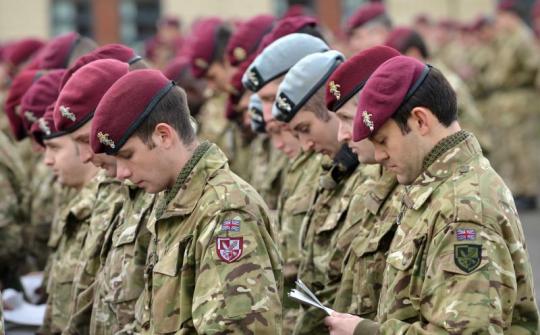
Don’t worry I’ve been called a lot worse! But I am grateful you don’t lump me with the other ‘poncey’ officers. Not sure what a female Rupert is called. The fact that I was never accused of being one by any of those I served with is perhaps something I take some measure of pride. There are not as many real toff officers these days compared to the past but there are a fair few Ruperts who are clueless in leading men under their charge. I knew one or two and frankly I’m embarrassed for them and the men under their charge.
I don’t know when the term PTSD was first used in any official way. My older sister who is a doctor - specialising in neurology and all round brain box and is currently working on the front lines in the NHS wards fighting Covid alongside all our amazing NHS nurses and doctors - took time out one evening to have a discussion with me about these issues. I also talked to one or two other friends in the psychiatric field too. In consensus they agree it was around 1980 when the term PTSD came into usage. Specifically it was the third edition of the Diagnostic and Statistical Manual of Mental Disorders (DSM-lll) published by the American Psychiatric Association in 1980 partly because as a result of the ongoing treatment of veterans from the Vietnam War. In the modern mind, PTSD is more associated with the legacy of the Vietnam War disaster.
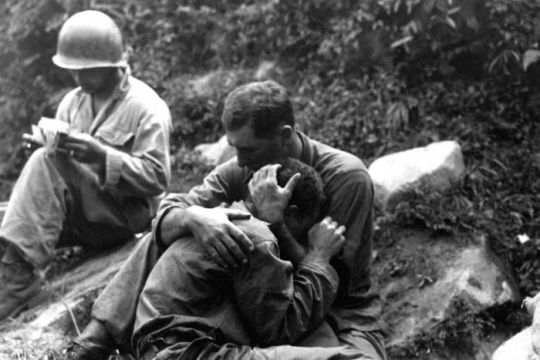
The importance of whether PTSD affected the ancient Greeks and Romans lies in the larger historical question of to what extent we can apply modern experience to unlock or interpret the past. In the period since PTSD was officially recognised, scholars and psychologists have noted its symptoms in descriptions of the veterans of past conflicts. It has become increasingly common in books and novels as well as articles to assume the direct relevance of present-day psychology to the reactions of those who experienced violent events in the historical past. In popular culture, especially television and film dramas, claims for the historical pedigree of PTSD are now often provided as background to the modern story, without attribution. Indeed we just take it as a given that soldier-warriors in the past suffered the same and in the same way as their modern day counterparts. We are used to the West to map the classical world upon the present but whether we can so easily map the modern world back upon the Greeks and Romans is a doubtful proposition when it comes to discussing PTSD.
Simply put, there is no definitive evidence for the existence of PTSD in the ancient world existed, and relies instead upon the assumption that either the Greeks or Romans, because they were exposed to combat so often, must have suffered psychological trauma.
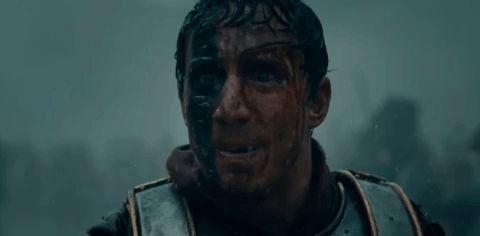
There are two schools of thought regarding the possibility of PTSD featuring in the Greco-Roman world (and indeed the wider ancient world stretching back into pre-history, myth and legend) – universalism and relativism. Put simply, the universalists argue that we all carry the same ‘wetware’ in our heads, since the human brain probably hasn’t developed in evolutionary terms in the eye blink that is the two thousand years or so since the Greco-Roman Classical era. If we’re subject to PTSD now, they posit, then the Greeks and the Romans must have been equally vulnerable. The relativists, on the other hand, argue that the circumstances under which the individual has received their life conditioning – the experiences which programme the highly individual software running that identical ‘wetware’, if you will – is of critical importance to an individual’s capacity to absorb the undoubted horrors of any battlefield, ancient or modern.
Whichever school one falls down on the side of is that what seems to happen in any serious discussion of the issue of PTSD in the ancient world is to either infer it indirectly from culture (primarily, literature and poetry) or infer it from a comparative historical understanding of ancient warfare. Because the direct evidence is so scant we can only ever infer or deduce but can never be certain. So we can read into it whenever we wish.
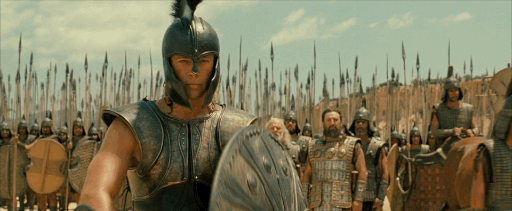
In Greek antiquity we have of course The Illiad and the Odyssey as one of the most cited examples when we look at the character traits of both Achilles and Odysseus. From Greek tragedy those who think PTSD can be inferred often point to Sophocles’s Ajax and Euripide’s Heracles. Or they look to Aeschylus and The Oresteia. I personally think this is an over stretch. Greek writers do; the return from war was a revisited theme in tragedy and is the subject of the Odyssey and the Cyclic Nostoi.
The Greeks didn’t leave us much to ponder further. But, with rare exceptions, the works from Graeco-Roman antiquity do not discuss the mental state of those who had fought. There is silence about the interior world of the fighting man at war’s end. So we are led to ponder the question why the silence?
This silence also echoes into the Roman period of literature and history too. Indeed when we turn to the Roman world, descriptions of veterans are rare in the writings that survive from the Roman world and occur most often in fiction.
In the first poem of Ovid’s Heroides, the poet writes about a returned soldier tracing a map upon a table (Ov. Her. 1.31–5):
...upon the tabletop that has been set someone shows the fierce battles, and paints all Troy with a slender line of pure wine:
‘Here the Simois flowed; this is the Sigeian territory,
here stood the lofty palace of old Priam, there the tent of Achilles...’
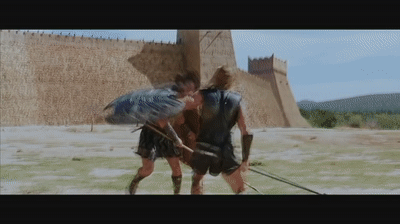
This scene provides an intimate glimpse of what it must have been like when a veteran returned home and told stories of his campaigns: the memories of battle brought to the meal, the crimson trail of the wine offering a rough outline of the places and battlefields he had experienced. The military characters in poems and plays show a world in which soldiers are ubiquitous, if somewhat annoying to the civilians. Plautus, for instance, in his Miles Gloriosus, portrays an officer boasting about his made-up conquests – the model for the braggart in A Funny Thing Happened on the Way to the Forum – and Juvenal complains about a centurion who stomps on his sandalled foot in the bustling Roman street.
Despite this silence, compelling works have been written that interweave vivid modern accounts of combat and its aftermath with quotes from ancient prose and poetry. At their best, these comparisons can illuminate both worlds, but at other times the concerns of the present-day author are imposed on the ancient material. But the question remains are such approaches truthful and valid in understanding PTSD in the ancient world?

So if arts and literature don’t really tell us much what about comparative examples drawn from military history itself?
Here again we are in left disappointed.
According to the Greek historian, Herodotus, in 480 B.C., at the Battle of Thermopylae, where King Leonidas and 300 Spartans took on Xerxes I and 100,000-150,000 Persian troops, two of the Spartan soldiers, Aristodemos and another named Eurytos, reported that they were suffering from an “acute inflammation of the eyes,”...Labeled tresantes, meaning “trembler,”. It is that Aristodemos later hung himself in shame. Another Spartan commander was forced to dismiss several of his troops in the Battle of Thermopylae Pass in 480 B.C, “They had no heart for the fight and were unwilling to take their share of the danger.”
Herodotus again in writing about the battle of Marathon in 490 B.C., cites an Athenian warrior who went permanently blind when the soldier standing next to him was killed, although the blinded soldier “was wounded in no part of his body.” Interestingly enough, blindness, deafness, and paralysis, among other conditions, are common forms of “conversion reactions” experienced and well-documented among soldiers today
Outside the fictional world, Roman military history tell us very little.
Appian of Alexandria (c. 95? – c. AD 165) described a legion veteran called Cestius Macedonicus who, when his town was under threat of capture by (the Emperor-to-be) Octavian, set fire to his house and burned himself within it. Plutarch’s Life of Marius speaks of Caius Marius’ behaviour who, when he found himself under severe stress towards the end of his life, suffering from night terrors, harassing dreams, excessive drinking and flashbacks to previous battles. These examples are just a few instances which seem to demonstrate that PTSD, or culturally similar phenomena, may be as old as warfare itself. But it’s worth stressing it is not definitive, just conjecture.
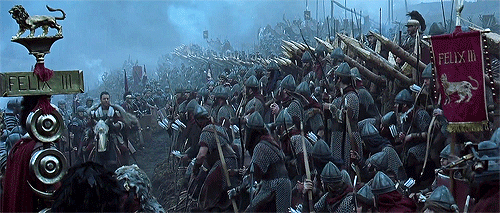
Of course of accounts of wars and battles were copiously written but not the hard bloody experience of the soldier. Indeed the Roman military man is described almost exclusively as a commander or in battle. Men such as Caesar who experienced war and wrote about it do not to tell us about homecoming.
It seems one of main challenges when we try to see military history through the lens of our definition of PTSD is to first understand the comparative nature of military history and what it is we are comparing ie mistaking apples for oranges.
The origin of military history was tied to the idea that if one understood ancient battle, one might fight and, more importantly, one might lead and strategise more effectively. In essence, much of the training of officers – even in the military handbooks of the Greeks and Romans – was an attempt to keep new commanders from making the same mistakes as the commanders of old. Military history is intended to be a pragmatic enterprise; in pursuit of this pragmatic goal, it has long been the norm to use comparative materials to understand the nature of ancient battle.
The 19th Century French military theorist Ardant du Picq argued for the continuity of human behaviour and assumed that the reactions of men under the threat of lethal force would be identical over the centuries: “Man does not enter battle to fight, but for victory. He does everything that he can to avoid the first and obtain the second....Now, man has a horror of death. In the bravest, a great sense of duty, which they alone are capable of understanding and living up to, is paramount. But the mass always cowers at sight of the phantom, death. Discipline is for the purpose of dominating that horror by a still greater horror, that of punishment or disgrace. But there always comes an instant when natural horror gets an upper hand over discipline, and the fighter flees”
These words offer insight to those of us who have never faced the terror of battle but at the same time assume the universality of how combat is experienced, despite changes in psychological expectations and weaponry, to name but two variables.
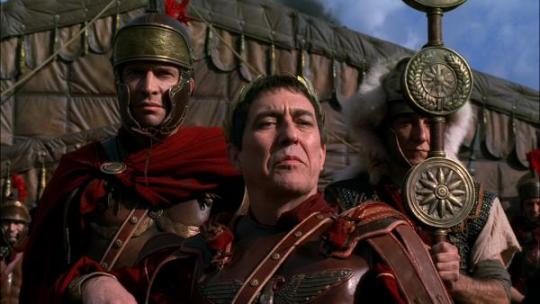
Another incentive for scholars and researchers is to turn to comparative material has been the growing awareness of the artificiality of how we describe war. A mere phrase such as ‘flank attack’ does not capture the bloody, grinding human struggle. Roman authors – especially those who had not fought – often wrote generic descriptions of battle. Literary battle can distort and simplify even as it tells, but if the main things are right – who won, who lost, and who the good guys are – the important ‘facts’ are covered. Even if one intends to speak the truth about battle, the assumptions and the normative language used to describe violence will affect the telling. We may note that the battle accounts in poetry become increasingly grisly during the course of the Roman Empire (perhaps owing to the growing popularity of gladiatorial games),while, in Caesar’s Gallic War, the Latin word cruor (blood) never appears and sanguis (another Latin word for blood) only appears in quoted appeals (Caes. B. Gall. 7.20, in the mouth of Vercingetorix, and 7.50, where the centurion M. Petronius urges his men to retreat). The realities of the battlefield are described in anodyne shorthand. In much the same way that the news rarely prints or televises graphic images, Caesar does not use gore, and perhaps for the same reason – to give a sense of reportorial objectivity.

Another element in the interpretive scrum is a given author’s goal in writing an account in the first place: Caesar, for example, was writing about himself, and he may have been producing something akin to a political campaign ad. Caesar makes Caesar look great and there is reason to believe that, if he was not precisely cooking the books, he did give them a little rinse to make him look more pristine. Given the many factors that complicate our ability to ‘unpack’ battle narratives, Philip Sabin has argued that the ambiguity and unreliability of the ancient sources must be supplemented by looking at the “form of the overall characteristics of Roman infantry in mortal combat”. Again the modern is used to illuminate that which is obscured by written accounts and the “the enduring psychological strains” are merely unconsciously assumed.
These legitimate uses of comparative materials have led to a sort of creep: because military historians have used observations of how men react to combat stress during battle to indicate continuity of behaviour through time, there appears to be a consequent expectation that men will also react identically after battle. This creep became a lusty stride with modern books written about the ancient world and PTSD.
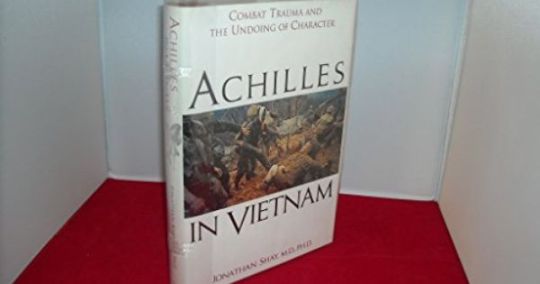
After I finished my tour in Afghanistan I read many books recommended to me by family and friends as well as comrades. One of these books is well known in military circles - at least amongst the thinking officer class - as an iconic work of marrying the ancient world and the modern experience of war. I read it and I was touched deeply by this brilliant therapeutic book. It was only months later I began to re-think whether it was a true account of PTSD in the ancient world.
This insightful book is called Achilles in Vietnam by Jonathan Shay. Shay is psychiatrist in Boston, USA. He began reading The Iliad with Vietnam veterans whom he was treating. Achilles in Vietnam, is a deeply humane work and is very much concerned with promoting policies that he hoped would help diminish the frequency of post-traumatic stress. His goal was not to explain ancient poetry but to use it therapeutically by linking his patients’ pain to that of the Iliad’s great hero. His book offers a conduit between the reader and the experiences of the men that Shay counsels. In the introduction to this work he makes a nod to Homerists while also asserting the primacy of his own reading:
“I shall present the Iliad as the tragedy of Achilles. I will not glorify Vietnam combat veterans by linking them to a prestigious ‘classic’ nor attempt to justify study of the Iliad by making it sexy, exciting, modern or ‘relevant’. I respect the work of classical scholars and could not have done my work without them. Homer’s poem does not mean whatever I want it to mean. However, having honored the boundaries of meaning that scholars have pointed out, I can confidently tell you that my reading of the Iliad as an account of men in war is not a ‘meditation’ that is only tenuously rooted in the text. “
After outlining the major plot points around which he will organise his argument, he notes, “ ‘This is the story of Achilles in the Iliad, not some metaphorical translation of it”.
The trouble was and continues to be is that many in the historical and medical fields began to rush to unfounded conclusions that Shay, on the issue of PTSD in the ancient world, had demonstrated that the psychological realities of western warfare were universal and enduring. More books on similar comparative themes soon emerged and began to enshrine the truth that PTSD was indeed prevalent throughout the ancient world and one could draw comparative lessons from it.
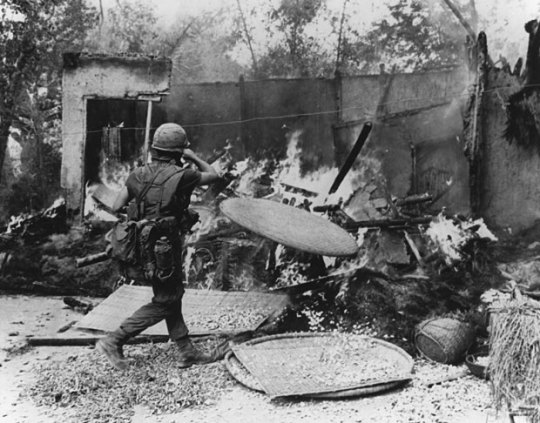
Perhaps one of the most influential books after Shay was by Lawrence Tritle. Tritle, a veteran himself, wrote From Melos to My Lai. It’s a fascinating book to read and there are parts that certainly resonate with my own experiences and those of others I have known. In the book Tritle drew a direct parallel between the experiences of the ancient Greeks and those of modern veterans. For instance, Xenophon, in his military autobiography, presents a brief eulogy for one of his fallen commanders, Clearchus. Xenophon writes that Clearchus was ‘polemikos kai philopolemos eschatos’ (Xen. An. 2.6) – ‘warlike and a lover of war to the highest degree’.
Tritle comments:
“The question that arises is why men like Clearchus and his counterparts in Vietnam and the Western Front became so entranced with violence. The answer is to be found in the natural ‘high’ that violence induces in those exposed to it, and in the PTSD that follows this exposure. Such a modern interpretation in Clearchus’ case might seem forced, but there seems little reason to doubt that Xenophon in fact provides us with the first known historical case of PTSD in the western literary tradition.”
Arguably in the West and especially our current modern Western culture is predicated at baulking at the notion of being ‘war lovers” as immoral. But such an interpretation speaks more of our modern Christianised ambivalence towards war; to the Spartans and Athenians the term would not have had a negative connotation. ‘Philopolemos’ is, in fact, a compliment, and the list of Clearchus’ military exploits functions as a eulogy. There are points where his analysis does not adequately address the divergences between ancient and modern experiences.
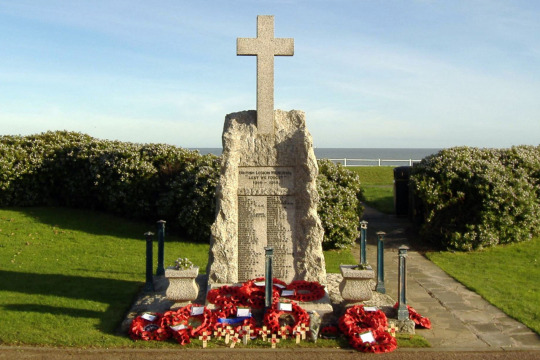
For all the talk of our Western culture being rooted in Ancient Greece and Rome we are not shaped by the same ethics. Our modern ethics and our moral code is Christian. There is no such thing as a secular humanist or atheist both owe a debt to Christianity for the way they have come to be; in many respects it’s more accurate to describe such people as Christianised Humanists or Christian Atheists even if they reject the theological tenets of the religious faith because they use Christian morality as the foundation to construct their own. Many forget just how brutal these ancient societies were in every day life to the point there would be little one could find recognisable within our own modern lives.
Now we come to third point I wish to make in determining where the Greeks or Romans actually experienced PTSD. This is to do with the little understood nature of PTSD itself. As much as we know about PTSD there is still much more we don’t know. Indeed one of the most problematic and complicated issues is the continued disagreement around the diagnosis and specific triggers of the disorder which remain little understood. We have to admit there are competing theories about what causes PTSD but, in terms of experiences that make it manifest, there are essentially three possible triggers: witnessing horrific events and/or being in mortal danger and/or the act of killing – especially close kills where the reality of one’s responsibility cannot be doubted. The last of these was strongly argued in another scholarly book by D. Grossman, On Killing, the Psychological Cost of Learning to Kill in War and Society (1995).
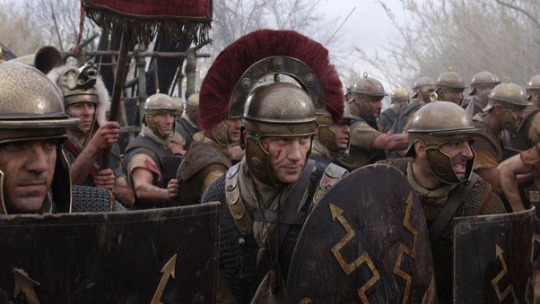
Roman soldiers had the potential to experience all of these things. The majority of Roman combat was close combat and permitted no doubt as to the killer. The comparatively short length of the gladius encouraged aggressive fighting. Caesar recounts how his men, facing a shield wall carried by the taller Gauls, leaped up on top of the shields, grabbed the upper edges with one hand, and stabbed downwards into the faces of their opponents (Caes. B. Gall. 1.52). As for mortal danger, Stefan Chrissanthos in his informative book, Warfare in the Ancient World: From the Rise of Uruk to the Fall of Rome, 3500BC-476AD, puts it this way: “For Roman soldiers, though the weapons were more primitive, the terrors and risks of combat were just as real. They had to face javelins, stones, spears, arrows, swords, cavalry charges, and maybe worst of all, the threat of being trampled by war elephants.”
Such terrors are regularly attested. During his campaign in North Africa, Caesar, noting his men’s fear, procured a number of elephants to familiarise his troops with how best to kill the beasts (Caes. B. Afr.72). It should also be noted that it was not unusual for the reserve line to be made up of veterans because they were better able to watch the combat without losing their nerve. Held in reserve, they had to watch stoically as their comrades were injured and killed, and contemplate the awful fact that they might suffer the same fate. This was not a role for the faint of heart.
However, while the Romans certainly had the raw ingredients for combat trauma, the danger for a Roman legionary was much more localised. Mortars could not be lobbed into the Green Zone, suicide bombers did not walk into the market, and garbage piled on the street did not hide powerful explosives. The danger for a Roman soldier was largely circumscribed by his moments on the field of battle, and even here, if he was with the victorious side, the casualties were likely to be light: at Gergovia, a disaster by Caesar’s standards, he lost nearly seven hundred men (Caes. B. Gall. 7.51). In his victory over Pompey the Great at Pharsalus, his casualties numbered only two hundred (Caes. B. Civ. 3.99).
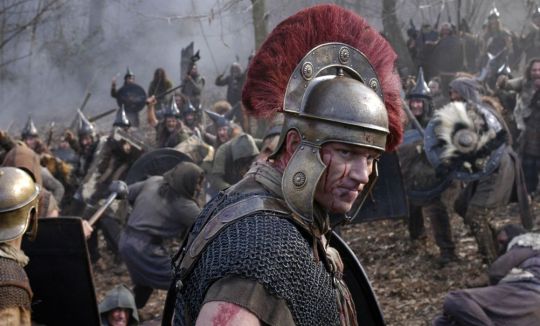
So we are left with the disturbing question: were the stressors really the same?
This is the part where I also defer to my eldest sister as a doctor and surgeon specialising in neurology and just so much smarter than myself.
My eldest sister holds the view in talking to her own American medical peers that despite similar experiences in Afghanistan and Iraq, British soldiers on average report better mental health than US soldiers.
My sister pointed out to research study done by Kings College London way back around 2015 or so that analysed 34 studies produced over a 15-year period (up to 2015) and found that overall there has been no increase in mental health issues among British personnel - with the exception of high rates of alcohol abuse among soldiers. The study was in part inspired the “significant mental health morbidity” among U.S. soldiers and reports that factors such as age and the quality of mental health programs contribute to the difference between the two nation’s servicemen and women.
She pointed out that these same studies showed that post-traumatic stress disorder afflicts roughly 2 to 5% of non-combat U.K. soldiers returning from deployment, while 7% of combat troops report PTSD. According to a General Health Questionnaire, an estimated 16 to 20% of U.K. soldiers have reported symptoms of common mental disorders, similar to the rates of the general U.K. population. In comparison, studies around the same time in 2014 showed U.S. soldiers experience PTSD at rates of 21 to 29%. The U.S. Department of Veteran Affairs estimated PTSD afflicted 11% of veterans returning from Afghanistan and 20% returning from Iraq. Major depression was reported by 14% of major soldiers according to another study commissioned by RAND corporation; roughly 7% of the general U.S. population reports similar symptoms.
It’s always tough comparing rates between countries and is not a reflection of the quality of the fighting soldier. But one finding that consistently and stubbornly refuses to go away is that over the past 20 years reported mental health problems tend to be higher among service personnel and veterans of the USA compared with the UK, Canada, Germany and Denmark.
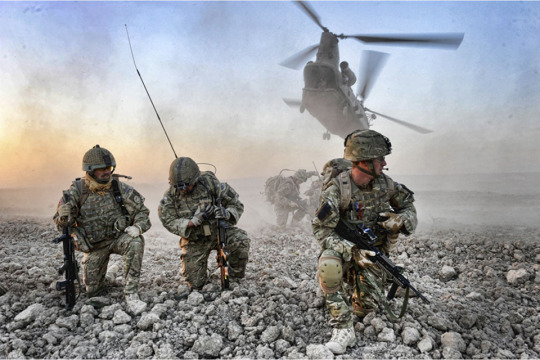
However my sister strongly cautioned against making hasty judgements. And there could be many variable factors at play. One explanation is that American soldiers are more likely than their British counterparts to be from the reserve forces. Empirical studies showed reservists from both America and British troops were more likely to experience mental illness post-deployment. It was also worth pointing out that American soldiers also tended to be younger - being younger and inexperienced as well as untested on the battlefield, service personnel would naturally run the risk of greater and be more vulnerable to mental illness.
In contrast, the elite forces of the British army, such as your brother’s Parachute Regiment or the Royal Marines, were found to be the least affected by mental illness. It was found that in spite of elite forces experiencing some of the toughest fighting conditions, they tended to enjoy better mental health than non-elite troops. The more elite a unit is or more professional then you find that troops tend to enjoy a very deep bonds of camaraderie. As such the social cohesion of these fighting forces provides a psychological protective buffer. Not for all, but for many.
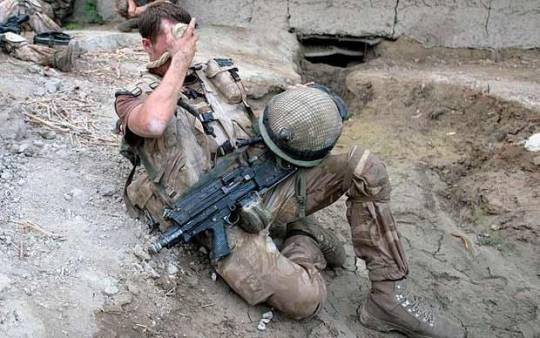
More intriguing are new avenues of discovery that might go a long way to actually understanding one of the root causes of PTSD. According to my sister, recent research carried out in the US and Europe and published in such prestigious medical journals as the New England Journal of Medicine (US) and the Lancet (UK), seems to establish a causal link between concussive injury and PTSD.
One recent study looked at US soldiers that concerned itself with the effects of concussive injuries upon troops after their return from active duty during the war in Iraq.
Of the majority of soldiers who suffered no combat injuries of any sort, 9.1 per cent exhibited symptoms consistent with PTSD. This allows a baseline for susceptibility of roughly 10% of the population. A slightly higher number (16.2%) of those who were injured in some way, but suffered no concussion, also experienced symptoms. As soon as concussive injuries were involved, however, the rates of PTSD climbed dramatically.
Although only 4.9% of the troops suffered concussions that resulted in complete loss of consciousness, 43.9% of these soldiers noted on their questionnaires that they were experiencing a range of PTSD symptoms. Of the 10.3% of the unit who suffered concussion resulting in confusion but retained consciousness, more than a quarter (27.3%) suffered symptoms. This suggests a high correlation between head trauma and the occurrence of subsequent psychological problems. The authors of the study note that ‘concern has been emerging about the possible long term effect of mild traumatic brain injury or concussion...as a result of deployment related head injuries, particularly those resulting from proximity to blast explosions’
Although these results are preliminary, if confirmed they have profound implications for anyone trying to understand the nature of warfare in the ancient world, especially the Western world.
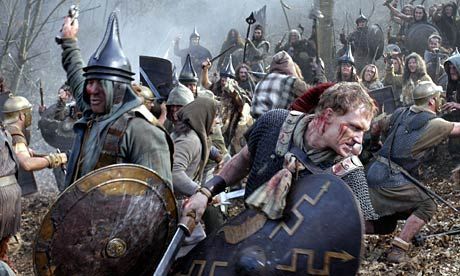
So why does it matter?
In Roman warfare, wounds were most often inflicted by edged weapons. Romans did of course experience head trauma, but the incidence of concussive injuries would have been limited both by the types of weapons they faced and by the use of helmets. Indeed the efficacy and importance of headgear for example can be deduced from the death of the Epirrote general Pyrrhus from a roof tile during the sack of Argos. It is likely that the Romans designed their helmets with an eye to blunting the force of the blows they most often encountered. Connolly has argued that helmet design in the Republican period suggests a crouching fighting stance (see P. Connolly, ‘The Roman Fighting Technique Deduced from Armour and Weaponry’, Roman Frontier Studies (1989). However my own view is that the change in helmet design may signal instead a shift in the role of troops from performing assaults on towns and fortifications when the empire was expanding (and the blows would more often rain from above) to the defence and guarding of the frontiers.
While the evidence is clear that concussion is not the only risk factor for PTSD, it is so strongly correlated that it suggests that the incidence of PTSD may have risen sharply with the arrival of modern warfare and the technology of gunpowder, shells, and plastic explosives. Indeed, accounts of shell shock from the First World War are common, and it was in the wake of that war that those observing veterans suspected that neurological damage was being caused by exploding shells.
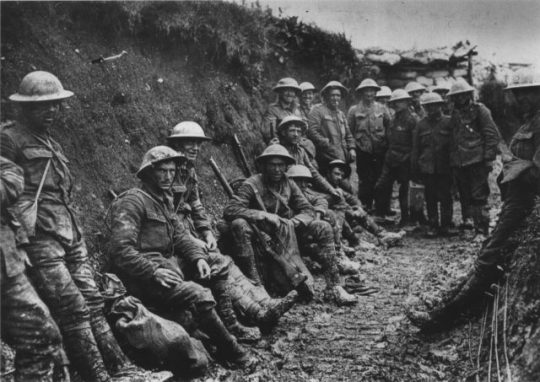
For soldiers of the Second World War and down to our modern day, an artillery barrage is like an invention of hell.
As one American put it in his memoirs of fighting the Japanese at Peleiu and Okinawa, “I developed a passionate hatred for shells. To be killed by a bullet seemed so clean and surgical but shells would not only tear and rip the body, they tortured one’s mind almost beyond the brink of sanity. After each shell I was wrung out, limp and exhausted. During prolonged shelling, I often had to restrain myself and fight back a wild inexorable urge to scream, to sob, and to cry. As Peleliu dragged on, I feared that if I ever lost control of myself under shell fire my mind would be shattered. To be under heavy shell fire was to me by far the most terrifying of combat experiences. Each time it left me feeling more forlorn and helpless, more fatalistic, and with less confidence that I could escape the dreadful law of averages that inexorably reduced our numbers. Fear is many-faceted and has many subtle nuances, but the terror and desperation endured under heavy shelling are by far the most unbearable” (see E.B. Sledge, With the Old Breed at Peleiu and Okinanwa, 2007).
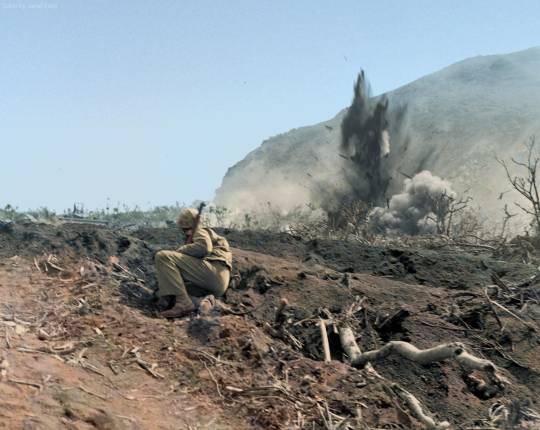
The psychological effect of shelling seems to result from the combined effect of awaiting injury while at the same time having no power to combat it.
There is another aspect that I alluded to above which is the psychological and societal conditioning of the Roman soldier. In other words a Roman male’s social and cultural expectations of his place in the world. Feelings of helplessness and fatalism were probably a less alien experience for most Romans – even those in the upper classes. In general, the Romans inhabited a world that was significantly more brutal and uncertain than our own.
This another way of saying that the Roman and 21st century combat are very different in a variety of ways that subject the modern soldier to a good deal more stress than the legionary was ever likely to suffer. And the Roman’s societal preparation – his life before the battle – was far more robust than that we enjoy today.
Take infant mortality. In the modern developed world, our infant mortality rates are about ten per thousand. In Rome, it is estimated that this number was three hundred per thousand. Three-tenths of infants would die within the first year, and an additional fifth would not make it to the age of ten - 50% of children would not survive childhood. Anecdotal evidence supports these statistics: Cornelia, the mother of the Gracchi, gave birth to twelve children between 163 bc and 152 bc; all twelve survived their father’s death in 152 bc, but only three survived to adulthood. Marcus Aurelius and his wife, Faustina, had at least twelve children but only the future emperor Commodus survived.
Then look at how that child grows up. The typical Roman child would be raised in a society that readily accepted ultra-violent arena entertainment, mob justice, frequent and bloody warfare as a fact of life. This was reinforced by religious and societal encouragement to see war as natural and beneficial, open butchering of food animals, a total lack of support structures for the poor and less able.
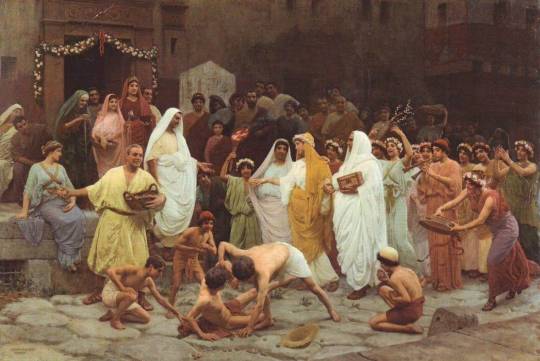
Compared to the legionary our modern soldier has been protected from such realities to a greater degree than at any other point in history, and will thus be far less well prepared for the horror of a warfare that contains far more stress factors than for a man who might fight a handful of battles in his military career, with long periods of relative calm in between, state of war notwithstanding. Modern special and elite forces training often emphasises the brutalisation and ‘rebuilding’ of the recruit in readiness for this step into darkness, but it seems likely that no such conditioning would have been needed two thousand years ago.
I would argue that we experience war very differently from the way the Romans did. Our modern identity is defined far more by our Western Christian heritage than our Western Classical roots. They are in fact world apart when it comes to ethics and morality. Consider the fact that when we talk of war and killing today we often do so through conflict between our civilian moral codes – which offer the strict injunction not to do violence to other human beings – and wartime, when men are commanded to violate such prohibitions. It is a terrible thing to try to navigate ‘Thou shalt not kill’ and the necessity of taking a life in combat.
It is sometimes the case that the qualities that make the best soldier do not make the best civilian, a point amply attested in Greek poetry by heroes such as Heracles and Odysseus.
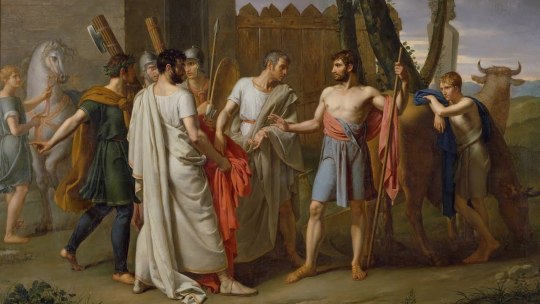
The Romans, for their part, celebrated heroes such as Cincinnatus, who could command effectively and then leave behind the power he wielded to return to his humble plough. It is important, however, when evaluating combat and its effects in the ancient world, that we do not read our ambivalence about violence onto the Romans. They inhabited an empire whose prosperity was quite openly tied to conquest.
As M. Zimmerman writes in his academic article, “Violence in Late Antiquity Reconsidered’ (2007), “The pain of the other, seen on the distorted faces of public and private monuments, or heard in the screams of criminals in the amphitheatre, reassured Romans of their own place in the world. Violence was a pervasive presence in the public space; indeed, it was an important basis for its existence, pertaining as it did not only to victories over external enemies but also to the internal order of the state.”
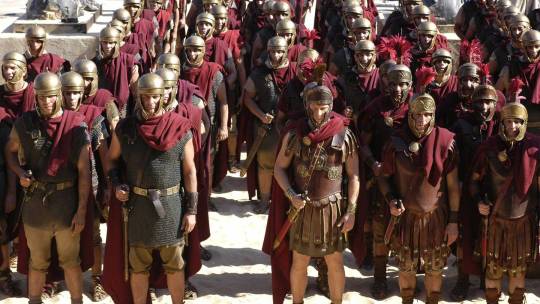
Violence then was both the means and the expression of Roman power. The Roman soldier was its instrument. The Roman warrior then would have brought a different perspective to lethal violence, and would have had a far more restricted moral circle to his modern counterpart – his friends and family, clan, patron and clients, as opposed to millions of fellow citizens via the internet and social media.
Part II follows next post
#question#ask#PTSD#war#roman#greek#classical#legionary#spartan#mental health#depression#trauma#warfare#british army#mental illness#homecoming#soldiers#combat veterans#veterans
46 notes
·
View notes
Text
My Roommate is an Apparition: WHAT A HORRIBLE NIGHT TO HAVE A DAD - Part 1
Based on characters created by @reddpenn
————————————-
It was Saturday afternoon and Lily was dancing around in a baggy shirt, baggy sweatpants, socks, and jamming out to Michael Jackson’s Thriller; blasting it out from her computer’s speakers. She had been vacuuming the floor, washing dishes, gathering trash, and doing other reasonable adult chores with a spring in her step. Lily was feeling fantastic and even if someone told her that her car had been towed and had a $300 fine, she wouldn’t have cared and continue to dance.
She was, to put it bluntly: hyped.
Something she had been looking forward to for a very long time was coming and Lily could not contain her glee. On the wall, her calendar had a big red circle around March 7th: the upcoming Thursday. In the pantry were a wide variety of snacks, munchies, treats, and goodies (some of them were leftover from the Pink Panther marathon a few weeks back, but were never opened, so they were still good). Visions of possible ways to decorate the apartment to celebrate floated through her head as her heart beat with excitement. To most others, this Thursday wasn’t anything particularly special, but In about six days...
...Castlevania Season Three was going to premiere on Netflix.
————————————-
As Lily danced while she worked, a pair of eyes were watching from the walls. Lily knew they were there, but didn’t mind, since she knew those eyes belonged to her apparition roommate. Their name was “Tulpa” (since that’s what they said it was when Lily asked) and recently, Lily had begun addressing them by name as opposed to simply “Roommate” or “Roomie”.
“Hey Tulpa!” Lily called out to the pair of eyeballs embedded into the wall, “Hope you don’t mind the music!”
Materializing from the wall, the nose-less, ear-less, long haired, spiky-toothed being moved closer and stared at their roommate doing the “Boogie of Unreachable Back Itch” with a puzzled look on their face. The apparition couldn’t remember the last time they ever saw Lily look this happy. Usually, she wasn’t nearly this energetic on her days off when doing chores, so something good must have happened.
“Why... are you... dancing?” Tulpa asked quietly in their trademark raspy voice. Unfortunately, they were too quiet since Lily didn’t hear a word they said over the music coming from the computer.
“Lily...” her roommate called out slightly louder, “Why... are you... dancing!?”
Once again, Lily couldn’t hear a thing and her ghostly roommate was starting to get annoyed. They needed to do something to get her attention, and in a way that didn’t disturb the neighbors, frighten Lily, or result in something breaking. (The two of them had a very long chat about it after “The Pink-ening” back in February.) Eyeing Lily’s computer, Tulpa got an idea and hovered over to it.
One quick YouTube search was all it took to change the music to something Tulpa was more... familiar with.
“IN THE HEART OF TRANSYLVANIA!
IN THE VAMPIRE HALL OF FAME, YEAH!
THERE’S NOT A VAMPIRE ZANIER THAN
DUCKULAAAAAAA!!!”
*click*
————————————-
Lily stopped the music and looked at Tulpa with a half-smile on her face. “You rang?” she said jokingly.
“Why... are you... dancing?” asked Tulpa.
Lily chuckled to herself, “I’m glad you asked!” she said joyfully, “One of my favorite shows has a new season premiering this Thursday! Castlevania!”
“Castle... vania?” Tulpa asked inquisitively. Despite being an apparition with no physical organs or body parts, they did have a memory, and something about that name seemed familiar. Almost reflexively, Tulpa said, “Simon... Belmont?”
Lily raised an eyebrow and looked at her surprisingly knowledgeable roommate. “You know about Simon Belmont!?”
“Mega... Man...” Tulpa continued, “Kid... Icarus...”
Lily was going to ask what Tulpa was talking about when her phone began to ring. Walking over, she picked up her smartphone and answered knowing exactly who it was on the other end. From the phone came a baritone voice that could best be described as “Overly Hammy”.
“YOOOOUUUUU HAVE MET WITH A TERRIBLE FAAAATE! A GREAT CUUUUUUURSE HAS BEEN PUT UPON YOOOOOUUUUU! OOOOOooooooooooo!”
“Hi Dad,” Lily answered with a smile.
“Hey sweetie!” came a cheerful voice over the phone, “Looking forward to this Thursday!?”
“You bet I am!” beamed Lily, “Did you hear they cast Bill Nighy to play Saint Germain!?”
“I did!” her father beamed back.
————————————-
As father and daughter chit-chatted on the phone, Tulpa looked over Lily’s shoulder with a slight look of envy. They could see how happy Lily was on the phone talking with her family. Tulpa, however, hadn’t used a phone in a very long time, and they were kind of amazed at how far phones had come. Any phone that let someone watch cartoons on it was the best phone ever in their book. Deep down, they wished they had one of their own. The apparition gave a breathless, wistful sigh as it watched Lily talk, but then Lily’s face was suddenly no longer smiling.
————————————-
“What do you mean THIS weekend?” she asked over the phone.
“Well I did say I was coming over the first weekend of March, didn’t I?”
“Yeah! March 7th and 8th, right!?” Lily asked starting to feel a little panicked now.
“Noooo...” her Dad trailed off, “I was talking about this weekend.”
“Dad! This is not the first weekend of March! It’s the last weekend of February!” Lily said with exasperation,
“Tomorrow’s March 1st, and a Sunday, right?” her Dad pleaded his case.
“Yeah! But the first weekend of any month usually means the first FULL weekend of any month! It doesn’t count if it’s half-and-half!” Lily stated as a sinking feeling began to form in her gut.
She could hear her Dad shrug over the phone, “Oh well, my mistake then.”
“YEAH!” said Lily, “I don’t even have the place cleaned up yet. I’m not ready to have company over!” Her roommate noticed that Lily was looking at them when they said that.
“Honey, you know I don’t care if the place is cleaned up or not,” her father said.
“I DO!” Lily almost shouted.
Despite her protesting, the apartment was actually looking good that Saturday. The vacuuming was finished, dishes were being washed in the dishwasher, trash had been taken out, the display cases for her rock collection had been dusted off, and the apartment was, for all intents and purposes, presentable. The real problem was that Lily hadn’t gone over her Dad’s visit with Tulpa yet to make sure they understood how to behave themselves.
“Look,” Lily began to beg, “Could you just stop by and visit next weekend? It’d work a lot better for me.”
“Yyyyyyeeeaaahhhh...” her Dad said while trailing off, “...about that...” As soon as he finished saying the word “about”, Lily began to feel a little nauseous as she whipped around to look at the front door. Beads of sweat were starting to form on her forehead as the dreaded noise she feared most came from her front door.
*KNOCK KNOCK KNOCK*
————————————-
Lily practically dropped the phone as her pupils shrank and panic began to set in. She turned to her roommate, and tried to grab their hand. Unfortunately, given Tulpa’s natural state of transparency, Lily’s hand went right through theirs. Realizing that wasn’t going to work, Lily began to frantically move her arms and make gestures to get Tulpa to hide.
Tulpa, meanwhile, wasn’t entirely sure what was going on, but picked up on Lily’s gestures and went into one of the bedrooms. Lily then closed the door and walked quickly over to the front door. She opened it up, and just as she suspected, there was her Dad standing right outside with his phone up to his ear.
“Hey, Hey, Hey!” he said with a smile, “Guess who’s here!”
Lily had to use every muscle she had to contort her face into a forced smile, “D-D-Dad! Hi!” There was no mistake that it was him. There were very few people who would consider a T-shirt that had an 8-bit pixel sprite with the caption “Uncle Vlad’s Wall Chicken” on it as “casual going out” clothes. It was a Christmas gift she had gotten him a few months earlier, and while she was glad to know it fit him okay, seeing him out and about in it was somehow incredibly embarrassing.
“May I come in?” he asked politely.
“Uhhhhh...” Lily stammered, “C-Could you give me a second. I just, ummm...” she trailed off while trying to think of an excuse, “...need to pick up some laundry off the floor. Yeah. Don’t want you stepping on any... underwear or socks or anything!” Lily’s laundry had already been cleaned, folded, and put away, including the towels in the linen closet, but her Dad didn’t know that, and she was banking on it.
“Sure!” her Dad agreed, “I did kind of drop in unannounced.”
“THANKS DAD!” Lily again almost hollered as she had to hold herself back from slamming the door when she closed it. She immediately ran to the room where Tulpa was and looked her square in the eyes. “Okay,” she began, “I know this is sudden, but my DAD is here! I’m going to need you to be on your BEST behavior while he’s here, okay?”
Tulpa blinked and looked at Lily with their usual vacant expression on their face. “...why?”
“BECAUSE... Because...” Lily trailed off as she tried to think of a good reason. Tulpa couldn’t be seen by anyone other than her, and she wasn’t entirely sure if other people could hear Tulpa either. But her ethereal roommate was somehow able to make the entire apartment pink last month all the way down to the toilet paper, and could hold and carry things in their ghost-like hands. “...I don’t want to scare him off!” was the best excuse Lily could think of off the top of her head.
Tulpa nodded, “...okay...” she said. Lily detected a hint of them sounding disappointed, but she’d find a way to make it up to them later.
“I’ll make it up to you later!”
[See? Told yah!]
Tulpa wasn’t entirely sure why Lily was acting so strange all of a sudden. She was acting as though her Dad would be able to see them even though they both knew that wasn’t possible. Despite this, Lily still seemed uncomfortable with the whole situation, and not wanting to trouble their friend, Tulpa nodded.
Lily followed up with a quick, “Thank you!” before turning around to dash to the front door.
————————————-
Opening the door again, Lily gestured to her father to come on in, “Make yourself at home!” she said like she knew full well just how cliche it was to say.
“Don’t mind if I do,” her Dad said with a smile as he walked in. It was then that Lily noticed the backpack he had on. She recognized it as the “Electronics” backpack her Dad carried whenever he was taking a laptop or any other electronic device with him to places. He headed straight to the living room, took his backpack off and began fishing around inside of it.
Lily gulped, “Did you bring-?” she began to ask before her Dad pulled out a family treasure from inside the backpack.
“Indeed I did!” he said proudly as he cut her off. In his hands was one of his most prized possessions:
A Nintendo Entertainment System.
It was the same NES that he got back when he was fourteen years old in 1986. He had been a video game fan ever since the early days of Atari and took meticulous care of his game systems to make sure they lasted and functioned for decades to come. Even in his middle-ages at forty-eight years old, he still had the same passion for video games as he did when he was a kid.
Only one question was on Lily’s mind which she had no trouble verbalizing: “Why?!”
Her Dad grinned a smug grin as he reached into the backpack and pulled out a small, black, plastic sleeve that contained an NES cartridge in it. It wasn’t just any NES cartridge either; it was Castlevania III: Dracula’s Curse.
Seeing that cartridge gave Lily mixed feelings. She could remember the times growing up with her father when he would insist that she sit down and play video games with him. But it often wasn’t so much to play them as it was to lecture her about them. He would regularly go on and on about the history of video games, how significant they were to modern society and culture, nifty bits of trivia, and for Lily, NOTHING took away the fun from video games more so than trying to make them an educational experience. In the back of her head, she knew they weren’t all like that; she still had many good memories playing games with her father (and playing the same games her father was lecturing about whenever he WASN’T lecturing), but the look in his eyes told her that this was going to be another one of his signature talks.
“Dad,” Lily pleaded, “No. No, please! Can’t we just, I dunno, watch Castlevania on Netflix? Maybe check out the Japanese dub or something?” She knew exactly what was about to happen. He was going to connect the NES to her TV, put Castlevania III in, and then play it while talking about how the game eventually became the show she adored with voice acting by Richard Armitage and Graham McTavish. All this to “prepare” for the season premiere in a few days.
Unfortunately for Lily, her father shook his head and said, “Now I didn’t spend my high school years breaking down blocks for wall meat and whipping away Medusa Heads for nothing. C’mon! Don’t you want to see your old man defeat Dracula?”
The answer to that was an emphatic “NO!” from Lily, but she wasn’t about to hurt her Dad’s feelings. While it wasn’t how she planned to spend her Saturday, she figured that as soon as he got it out of his system, the sooner he could head back home. Plus, talkative as he was, he was still rather decent at playing difficult video games even at forty-eight years old. As long as everything went well, he ought to be able to finish the game in about an hour; two hours tops.
————————————-
Meanwhile, a pair of eyes was watching from the bedroom door (as in, within the bedroom door) as Lily’s Dad effortlessly hooked up the NES to the TV. Tulpa began to remember some of the people that used to live here also had video game systems like the one Lily’s Dad was hooking up. They were pretty interesting, and Tulpa was somewhat curious about them even if they weren’t cartoons. Eager to see more of what was going on, they poked their head out more and more from the door.
Lily sighed as her Dad continued to fiddle with the cables behind the TV, and turned around in time to see Tulpa who was now poking their head out in full view. Before Lily could say or do anything...
“AAUUGGHH!!”
Lily spun back around and looked at her father who looked like he had seen a ghost...
...but he was actually looking at the jumbled mess of pixels on the TV screen. “Aww man,” he groaned, “I thought I cleaned this already!” Turning to his daughter, he asked, “Hey can you reach into my backpack and grab the Q-Tips and alcohol?”
Sure enough, there was a bottle of Isopropyl alcohol and Q-Tips in the backpack, and Lily deftly fished them out and gave them to her man-child of a father. Or was the correct term “Child-Man”? Lily wasn’t quite sure but pushed that thought to the side as she said to him, “Hey, I’m gonna use the bathroom real quick! B.R.B.!”
“Okie dokie,” her Dad said as he happily cleaned the game cartridge pins. He always found something so cathartic about cleaning cartridges and getting them to work. It was almost zen-like.
Of course, Lily did not go to the bathroom. Instead, she walked right over to Tulpa’s levitating elongated neck and head, opened the door they were peeking out from (which pulled their head out of the door), and marched in with a mixture of disapproval, frustration, and worry on their face. “What are you DOING!?” she demanded with her teeth clenched and her voice lowered.
“Want to... see,” Tulpa said bashfully. Lily noticed that they weren’t looking her in the eyes.
“It’s just my DAD and his games!” pleaded Lily.
“I’d like... to meet... him,” said the curious ghost.
Lily turned to look at the door, then back to Tulpa, and raised her thumb like a hitchhiker to point to the door behind her. “Him!?” Lily said incredulously, “What for!? He can’t even see or hear you anyway!”
It was true that Tulpa could not be seen by anyone other than Lily, and Tulpa knew that all too well. Not a single living soul was able to see or truly hear them any time before now. Lily was the exception and neither of them had any idea why. But, the apparition thought to itself, the person out in the living room was Lily’s father. What if...
“AH HA!” Lily practically jumped from her father’s victorious cheer, “I GOT IT!” he crowed from the living room. Lily did a small face palm as the shout gave her flashbacks to when she was eight-years old and her Dad would practically scream at the top of his lungs every time he died playing Ninja Gaiden after Lily had gone to sleep. Few things were more terrifying than being woken up out of a deep dream by the shrill shrieks of your own father.
Lily turned to Tulpa and made a shushing gesture, “If you’re gonna watch, just... make sure not to touch anything so he won’t know someone’s there, okay!?”
Tulpa nodded, somewhat solemnly, as Lily stepped out to join her Dad in the living room. Inside the room Tulpa was in, there was a large mirror attached to a vanity table. The inquisitive incorporeal individual looked at its reflection in the mirror. They could see their matted hair and large googly eyes, as well as lack of facial features, and for the first time in its existence, began to think about its appearance.
No one before could see them, so what they looked like never really mattered. Lily was the first person who could see Tulpa, and she accepted them for just the way they were. That was something they really liked about Lily. At the same time though, they never thought about how they wanted others to see them if they could see them.
Tulpa thought about how Lily included them in the things she did, and how much they enjoyed spending time with Lily. Even if they weren’t watching cartoons, the time they shared was always fun and enjoyable. They wanted to get to know Lily better, and what better way than by getting to meet her Dad? Wouldn’t it be better if they were all together?
Sure he probably wouldn’t be able to see them, but...
...maybe he could?
And if he could, what would he think of them?
What would Tulpa want them to think of them?
Continuing to stare at themselves in the mirror, Tulpa made a decision. It was going to take all of their concentration, but “nothing ventured, nothing gained.” It began by taking a very, very, very deep breath. They sucked in as much air as they could, practically inflating themselves like a balloon.
Once they had inhaled as much as they could, they held their mouth shut and tried to squeeze the air out using whatever specters had for muscles. The human equivalent would have been if someone were to hold their breath, pinch their nose, and try to get their ears to pop. A small popping noise could be heard in the room, as Tulpa succeeded in popping out some ears.
————————————-
Back in the living room, Lily was resting her arm on the armrest of the couch, with face resting in the palm of her hand, and looking extremely bored. Her Dad was already sitting on the opposite end of the couch, navigating Trevor Belmont through Stage 1 after showing off how the game’s prologue fit the Netflix show’s narrative. Lily was, naturally, not paying attention to any of it as her mind was somewhere else completely.
“What am I doing?” she thought to herself, “Why does it matter if Tulpa’s out here or not? I mean, it’s not like Dad can see them or anything.” As she thought to herself, deep down she came to realize what her problem was. It wasn’t about her Dad meeting Tulpa, it was about Tulpa meeting her Dad!
Despite him being good natured and an affable person, he was still her Dad, and Dads by definition tended to be embarrassing as Hell! He had actually researched Dad jokes and has kept an arsenal of them up his sleeves ever since Lily could remember. He rarely ever acted like an average 48-year old man in public, and some times, Lily would feel ashamed that between the two of them, she would be considered the adult.
(During the Christmas season, he saw all the Teenage Mutant Ninja Turtles 1-Up Arcade Cabinets on display in Wal-Mart and would always turn them on and set the volume to maximum! According to him, he was trying to recreate the “arcade atmosphere” of his youth.)
But despite the occasional embarrassment, he was still her Dad, and she wouldn’t trade him for any other Dad in the world. He was always open minded, and whenever he didn’t understand something, he made an effort to try and understand. Like that time he asked her to show him her rock collection and tell him about all the different kinds she had and what made them so unique. He was always a cool Dad like that.
He raised her the best that he could and helped her with her homework. He drove her to places she wanted to go when she was little, and took her to theme parks, the zoo, science centers, museums... he was always actively involved in her upbringing and that meant a lot to Lily.
The sound of a door opening and closing could be heard from the hallway.
“I’m overreacting, aren’t I?” she thought to herself. “I should have just asked Tulpa to sit down and watch him play. I mean, misery loves company, right? And plus he-“
It was at that moment that Lily’s eyes began to widen as she realized she had just heard the sound of a door opening and closing come from the hallway. Her Dad turned around at the noise and Lily whipped herself around at breakneck speed. She nearly choked on her own spit at what she saw.
It was Tulpa.
It was definitely Tulpa...
...But they looked human!
They had a nose, two ears, and opaque, pale skin. Their hair still looked matted and unwashed, their eyes were still large, and their teeth still looked sharp even though they were a bit more rounded. They were wearing a turtleneck blouse and a long skirt that went all the way down to their ankles. On their feet were white socks which were probably there since Tulpa hadn’t really gotten the hang of manifesting realistic feet yet. And they were definitely female (or going for the feminine look).
They looked kind of like that one really tall girl from that really popular anime everyone kept talking about, “Hands Off My Aerosol Can” or something like that.
There was a brief moment of silence in the room that felt like it stretched on for an eternity (even though it only lasted a fraction of a second). Lily’s Dad was looking right at them, or at least, in their direction. Lily could tell Tulpa had “dressed up” to meet her father, but doubted it would have mattered since there was no way he could-
“Hi there! You must be Lily’s roommate!” greeted Lily’s Dad.
...To Be Continued...
683 notes
·
View notes